- AI Essay Grader

Premium Essay Grader
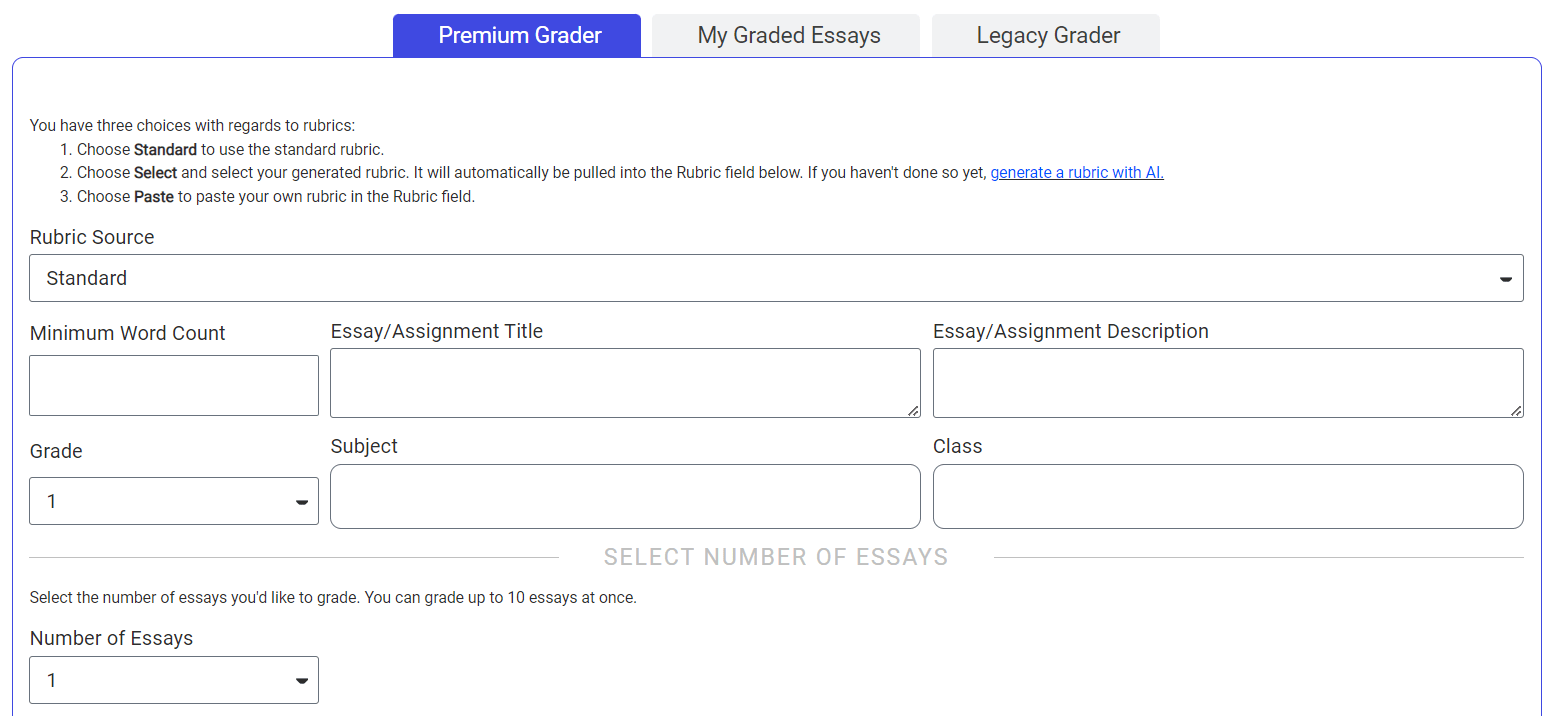
Sample AI Graded Essay
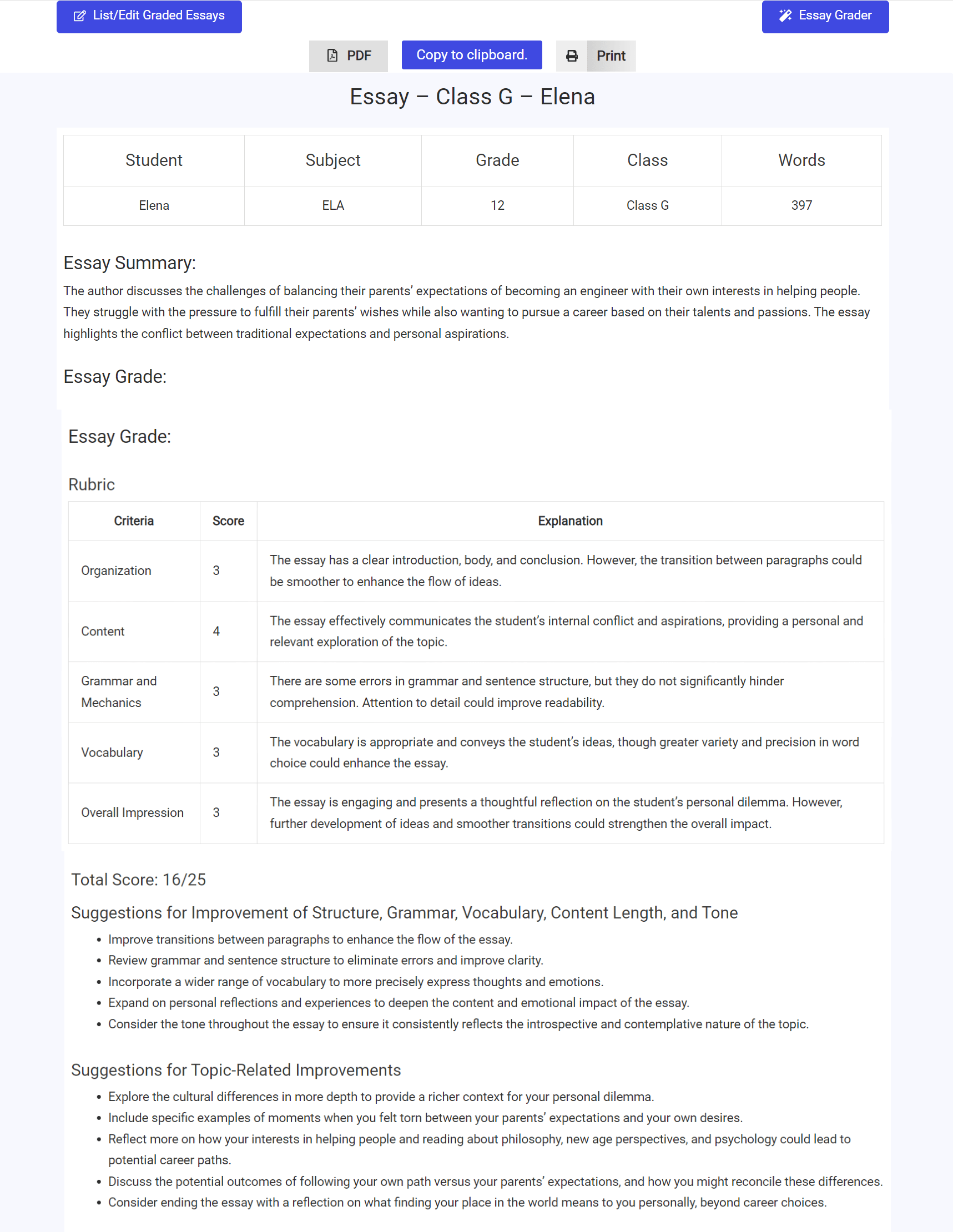
About Our AI Essay Grader
Welcome to the future of education assessment with ClassX’s AI Essay Grader! In an era defined by technological advancements, educators are constantly seeking innovative ways to streamline their tasks while maintaining the quality of education. ClassX’s AI Essay Grader is a revolutionary tool designed to significantly alleviate the burden on teachers, offering a seamless and efficient solution to evaluate students’ essays.
Traditionally, assessing essays has been a time-consuming process, requiring educators to meticulously read through each piece of writing, analyze its content, and apply complex rubrics to assign grades. With the advent of AI, however, the landscape of education evaluation is rapidly changing. ClassX’s AI Essay Grader empowers teachers by automating the grading process without compromising on accuracy or fairness.
The concept is elegantly simple: teachers input or copy the students’ essays into the provided text box, select the appropriate grade level and subject, and ClassX’s AI Essay Grader takes it from there. Leveraging the cutting-edge technology of ChatGPT, the AI system meticulously evaluates essays against a predefined rubric. The rubric encompasses various criteria, ranging from content depth and structure to grammar and style, ensuring a comprehensive assessment of the writing.
| Criteria | Score 4 | Score 3 | Score 2 | Score 1 |
| Organization | Writing has a clear introduction, body, and conclusion with appropriate use of paragraphs. | Writing has a clear introduction and conclusion but may have some inconsistencies in paragraphing. | Writing has some attempt at organization but lacks a clear introduction, body, or conclusion. | Writing is disorganized and lacks clear structure. |
| Content | Writing includes relevant details, facts, or examples that support the main idea. | Writing includes some relevant details, facts, or examples, but may lack consistency or specificity. | Writing includes limited or unrelated details, facts, or examples. | Writing lacks relevant content or is off-topic. |
| Grammar and Mechanics | Writing demonstrates correct use of punctuation, capitalization, and verb tense. | Writing has some errors in punctuation, capitalization, or verb tense, but does not significantly impact readability. | Writing has frequent errors in punctuation, capitalization, or verb tense that may impact readability. | Writing has pervasive errors in punctuation, capitalization, or verb tense that significantly impact readability. |
| Vocabulary | Writing uses a variety of age-appropriate vocabulary with precise word choices. | Writing uses some age-appropriate vocabulary but may lack variety or precision. | Writing uses limited or basic vocabulary that may not be age-appropriate. | Writing lacks appropriate vocabulary or word choices. |
| Overall Impression | Writing is engaging, well-crafted, and demonstrates strong effort and creativity. | Writing is generally engaging and shows effort, but may have some areas for improvement. | Writing is somewhat engaging but lacks polish or effort. | Writing is not engaging, poorly crafted, or lacks effort. |
Teachers can now allocate more time to personalized instruction, classroom engagement, and curriculum development, rather than being bogged down by the time-consuming task of manual essay evaluation. The AI’s rapid and consistent grading also means that students receive prompt feedback on their work, enabling them to learn from their mistakes and improve their writing skills at an accelerated pace.
Moreover, the AI Essay Grader enhances objectivity in grading. By removing potential biases and inconsistencies inherent in manual grading, educators can ensure that every student receives a fair and unbiased evaluation of their work. This contributes to a more equitable educational environment where all students have an equal chance to succeed.
In summary, ClassX’s AI Essay Grader represents a groundbreaking leap in the evolution of educational assessment. By seamlessly integrating advanced AI technology with the art of teaching, this tool unburdens educators from the arduous task of essay grading, while maintaining the highest standards of accuracy and fairness. As we embrace the potential of AI in education, ClassX is leading the way in revolutionizing the classroom experience for both teachers and students.
Share this tool
- Categories: AI Tools , AI Tools for Teachers , Assessments and Grading
- Keywords: essay , essay grade , grade essay , grading
Privacy Overview
| Cookie | Duration | Description |
|---|---|---|
| cookielawinfo-checkbox-analytics | 11 months | This cookie is set by GDPR Cookie Consent plugin. The cookie is used to store the user consent for the cookies in the category "Analytics". |
| cookielawinfo-checkbox-functional | 11 months | The cookie is set by GDPR cookie consent to record the user consent for the cookies in the category "Functional". |
| cookielawinfo-checkbox-necessary | 11 months | This cookie is set by GDPR Cookie Consent plugin. The cookies is used to store the user consent for the cookies in the category "Necessary". |
| cookielawinfo-checkbox-others | 11 months | This cookie is set by GDPR Cookie Consent plugin. The cookie is used to store the user consent for the cookies in the category "Other. |
| cookielawinfo-checkbox-performance | 11 months | This cookie is set by GDPR Cookie Consent plugin. The cookie is used to store the user consent for the cookies in the category "Performance". |
| viewed_cookie_policy | 11 months | The cookie is set by the GDPR Cookie Consent plugin and is used to store whether or not user has consented to the use of cookies. It does not store any personal data. |
- Learn the Alphabet
- Children's Music
- Video Lessons
AI CONVERSATIONS
- AI Homework & Project Helper
- Interview a Historical Figure
- AI Conversation Practice
- AI Book Chat
- AI Country Guide
AI TOOLS FOR STUDENTS
- AI Dictionary
- AI Thesaurus
- AI Sentence Generator
- AI Grammar Correction
- AI Paraphraser
- AI Summarizer
- AI Lyrics Generator
- AI Poem Generator
- AI Ancient Text Translator
- AI Children's Story Generator
- Role-Play Game: Fantasy Quest
- AI Figure of Speech Generators
AI TOOLS FOR TEACHERS
- AI Rubric Generator
- AI Prompt Optimizer
- AI Lesson Creator
- AI Lesson Plan Creator
- AI Multiple-Choice Quiz Creator
- AI True-False Quiz Creator
- AI Fill-in-the-Blanks Quiz Creator
- AI Book Quiz Creator
- AI Report Card Comments
- AI Comments for English Teachers
- IEP Generator
- AI Homework Helper

Suggestions
Suggest an ai tool or improvements to an existing one..

The world’s leading AI platform for teachers to grade essays
EssayGrader is an AI powered grading assistant that gives high quality, specific and accurate writing feedback for essays. On average it takes a teacher 10 minutes to grade a single essay, with EssayGrader that time is cut down to 30 seconds. That's a 95% reduction in the time it takes to grade an essay, with the same results.
How we've done
Happy users
Essays graded
EssayGrader analyzes essays with the power of AI. Our software is trained on massive amounts of diverse text data, including books, articles and websites. This gives us the ability to provide accurate and detailed writing feedback to students and save teachers loads of time. We are the perfect AI powered grading assistant.
EssayGrader analyzes essays for grammar, punctuation, spelling, coherence, clarity and writing style errors. We provide detailed reports of the errors found and suggestions on how to fix those errors. Our error reports help speed up grading times by quickly highlighting mistakes made in the essay.
Bulk uploading
Uploading a single essay at a time, then waiting for it to complete is a pain. Bulk uploading allows you to upload an entire class worth of essays at a single time. You can work on other important tasks, come back in a few minutes to see all the essays perfectly graded.
Custom rubrics
We don't assume how you want to grade your essays. Instead, we provide you with the ability to create the same rubrics you already use. Those rubrics are then used to grade essays with the same grading criteria you are already accustomed to.
Sometimes you don't want to read a 5000 word essay and you'd just like a quick summary. Or maybe you're a student that needs to provide a summary of your essay to your teacher. We can help with our summarizer feature. We can provide a concise summary including the most important information and unique phrases.
AI detector
Our AI detector feature allows teachers to identify if an essay was written by AI or if only parts of it were written by AI. AI is becoming very popular and teachers need to be able to detect if essays are being written by students or AI.
Create classes to neatly organize your students essays. This is an essential feature when you have multiple classes and need to be able to track down students essays quickly.
Our mission
At EssayGrader, our mission is crystal clear: we're transforming the grading experience for teachers and students alike. Picture a space where teachers can efficiently and accurately grade essays, lightening their workload, while empowering students to enhance their writing skills. Our software is a dynamic work in progress, a testament to our commitment to constant improvement. We're dedicated to refining and enhancing our platform continually. With each update, we strive to simplify the lives of both educators and learners, making the process of grading and writing essays smoother and more efficient.We recognize the immense challenges teachers face – the heavy burdens, the long hours, and the often underappreciated efforts. EssayGrader is our way of shouldering some of that load. We are here to support you, to make your tasks more manageable, and to give you the tools you need to excel in your teaching journey.
Join the newsletter
Subscribe to get our latest content by email.
Spend less time grading , more time teaching
CoGrader is the AI Essay Grader that helps teachers provide quality feedback on essays in 80% less time.
Used at 1000+ schools
Backed by UC Berkeley
The AI Essay Grader that makes grading a breeze
Grading essays manually is a never-ending task that consumes valuable time and energy, often leaving teachers frustrated and overwhelmed
With CoGrader, grading becomes a breeze. You will have more time for what really matters: teaching, supporting students and providing them with meaningful feedback.
Meet your CoGrader
Leverage Artificial Intelligence (AI) to get draft Feedback on your students' assignments instantaneously and see class data analytics.
Save time and Effort
Streamline your grading process and save hours or days.
Ensure fairness and consistency
Remove human biases from the equation with CoGrader's objective and fair grading system.
Provide better feedback
Provide lightning-fast comprehensive feedback to your students, helping them understand their performance better.
Class Analytics
Get an x-ray of your class's performance to spot challenges and strengths, and inform planning.
Google Classroom Integration
Import assignments from Google Classroom to CoGrader, and export reviewed feedback and grades back to it.
Canvas and Schoology compatibility
Export your assignments in bulk and upload them to CoGrader with one click.
More features soon
Teachers love cograder.
Thank you again. I am excited to assign more writing (my kids need so much practice!) now that I can give them specific and objective feedback more quickly . I may even postpone my retirement because of your product! I am 61, and now I think I can make it to 65.
Irene H., California
I am absolutely blown away by CoGrader so far! It has been excellent for pre-scoring essays and providing students with comprehensive, usable feedback. It has helped mitigate my subjectivity in scoring as well.
Megan P., Kentucky
I have been wishing for something like CoGrader since I started teaching and this is like a miracle to me. I think the feedback I'm going to be able to give my students is just unbelievable. I keep running around school telling everyone about it .
Mad M., Florida
I used CoGrader to assess 30 personal narratives with my own rubric. It was amazing! I loved all the personalized feedback for each student. Although it took a bit to figure out the logistics since I don't use Google classroom, it was worth it! I was able to get those papers graded in record time and still had plenty of time to enjoy the rest of my spring break!
Michelle H., Indiana
I am really enjoying getting familiar with CoGrader, and my students are finding the feedback very useful . This could be a game-changer for time management, and I am so excited about the possibilities!
Krista R., Indiana
I started my free trial period - and I am LOVING it! I recently had my 85 sixth grade students write a narrative that would have taken me weeks to grade. With CoGrader, they were graded with amazing feedback in, literally, seconds.
Jamie G., New York
I discovered CoGrader today and I can't thank you enough! What usually takes me days (and way too many hours of off-contract time), took me mere hours. It is such a find that I plan on hosting a PD for my staff in the next few weeks.
Heather G., California
I am just getting into using CoGrader and I LOVE it! It is giving much better and more relevant feedback to students than other Al feedback generators do. So, thank you for that!
Amy K., Maryland
THANKS! Co-workers, students and I have compared results from CoGrader with a variety of other AI scoring for AP essays, and yours is BY FAR the most accurate, with the best feedback (I score for the AP Exam).
Cathy U., Massachusetts
So far, I like it very much. It saves me a lot of time because I can quickly see how a student scores and then have the option to edit scores, details, and the reasoning behind it. I especially like that I can upload my own rubrics (we're required to make our own). I appreciate how easy you were to contact, too.
Lisa T., Colorado
I LOVE it and shared it with my co-workers.
Amy B., California
I can't figure out why y'all complain. This is amazing . I almost cried when I used it. It was as if someone handed me my weekends back on a silver platter.
Michelle F., Colorado
I LOVE COGRADER!!!!! I just graded an assignment and sent the feedback to the students to complete a rewrite using the feedback !!!! I teach 9th grade World History.
Susan R., New Jersey
Short version, I absolutely love it. The feedback it gives is much more detailed than I have time to provide and yet, I'm still able to go in and add my own comments if needed and adjusted points if I want to. This allows me to assure parents that I AM looking at their children's papers and not just turning them over to an Al to grade. Love it!
Louis S., Washington
Honestly? The concept is pretty damn fantastic. It's the sort of thing I've been hoping would eventually exist. It's doing a pretty good job with my 9th Honors intro paragraphs so far. I love the format of being able to see student writing on the right and seeing feedback (the whole glow, grow, etc. thing is adorable without being too cheesy and I love it). I also like being able to see the rubric and adjust scoring levels.
Amy S., California
Hello, I am testing your Al product and so far it is the best That I have experienced. I teach AP Language and Composition with 138 students in 4 sections that I teach.
James H., Texas
I'II admit, I was skeptical of the site at first. But after using it to grade my students' narratives, I'm pretty much sold on it. I don't think any Al is going to be perfect when it comes to grading essays, but this comes pretty darn close.
Jacob R., Ohio
I'm loving it. I've tried multiple Al grading systems, all have problems with functionality and costs are not very teacher-friendly. However, yours is impressively functional and hasn't cost me a penny. Honestly, I've been waiting for you all to spring a bill on me. (Lol)
Jared S., Texas
I 'm really grateful to have access to this ! I'm going to play around with it a bit more and make a few templates. I'm curious what it will do with the AP rubrics and scori sample texts. Those are normed, but they also have scoring justifications that would be neat to see how CoGrader reacts to.
Andrew G., Colorado
It gives far more feedback than I would. Especially considering how many essays I grade. This is huge for me. I love that the essay is to the right and I can edit the comments and add my own and adjust the score. I also tested it by posting an essay on my AP Lang facebook group. Essentially asking other AP graders to grade the essay. I scored it a 1/3/0, cograder scored it as a 1/3/0, and the random AP teacher that volunteered to grade the essay scored it a 1/3/0. So that is pretty good.
Jason Y., North Carolina
I am in love with the program so far. Al is a game changer.
Shannon W., Texas
I can already tell it's going to be a game changer! I' m so impressed by the level of feedback and specific improvements it suggests . Would like to look into your advocate program!
I just signed up another teacher, and she cried when she saw how fast CoGrader wrote feedback on the college essays that she is feeling anxious about being 2 weeks late grading. This is her first full-time teaching job, and she was feeling like a failure, because it's not possible to keep up with what some people expect of her, and what she's been taught to expect of her self. CoGrader is going to help her stay in teaching.
I would absolutely LOVE it if Al would give feedback to my students... Then, give me an overview of their strengths and weaknesses. And point out specifics for students or groups of students for their needs and for their strengths.
Tamara H., New Jersey
How does CoGrader work?
It's easy to supercharge your grading process
Import Assignments From Your Platform
CoGrader works with Google Classroom, Canvas and Schoology.
Define Grading Criteria
Use our rubric template, based on your State's standards, or set up your own grading criteria to align with your evaluation standards, specific requirements and teaching objectives.
Get Grades, Feedback and Reports
CoGrader generates detailed feedback and justification reports for each student, highlighting areas of improvement together with the grade.
Review and Adjust
The teacher has the final say! Adjust the grades and the feedback so you can make sure every student gets the attention they deserve.
Want to see what Education looks like in 2024?
Get started right away, not sure yet, frequently asked questions.
CoGrader: the AI copilot for teachers.
You can think of CoGrader as your teaching assistant, who streamlines grading by drafting initial feedback and grade suggestions, saving you time and hassle, and providing top notch feedback for the kids. You can use standardized rubrics and customize criteria, ensuring that your grading process is fair and consistent. Plus, you can detect if your student used ChatGPT to answer the assignment.
CoGrader considers the rubric and your grading instructions to automatically grade and suggest feedback, using AI. Currently CoGrader integrates with Google Classroom and will soon integrate with other LMS. If you don't use Google Classroom, let your LMS provider know that you are interested, so they speed up the process.
Try it out! We have designed CoGrader to be user-friendly and intuitive. We offer training and support to help you get started. Let us know if you need any help.
Privacy matters to us and we're committed to protecting student privacy. We are FERPA-compliant. We use student names to match assignments with the right students, but we quickly change them into a code that keeps the information private, and we get rid of the original names. We don't keep any other personal information about the students. The only thing we do keep is the text of the students' answers to assignments, because we need it for our grading service. This information is kept safe using Google’s secure system, known as OAuth2, which follows all the rules to make sure the information stays private. For a complete understanding of our commitment to privacy and the measures we take to ensure it, we encourage you to read our detailed privacy policy.
CoGrader finally allows educators to provide specific and timely feedback. In addition, it saves time and hassle, ensures consistency and accuracy in grading, reduces biases, and promotes academic integrity.
Soon, we'll indicate whether students have used ChatGPT or other AI systems for assignments, but achieving 100% accurate detection is not possible due to the complexity of human and AI-generated writing. Claims to the contrary are misinformation, as they overlook the nuanced nature of modern technology.
CoGrader uses cutting-edge generative AI algorithms that have undergone rigorous testing and human validation to ensure accuracy and consistency. In comparisons to manual grading, CoGrader typically shows only a small difference of up to ~5% in grades, often less than the variance between human graders. Some teachers have noted that this variance can be influenced by personal bias or the workload of grading. While CoGrader works hard to minimize errors and offer reliable results, it is always a good practice to review and validate the grades (and feedback) before submitting them.
CoGrader is designed to assist educators by streamlining the grading process with AI-driven suggestions. However, the final feedback and grades remain the responsibility of the educator. While CoGrader aims for accuracy and fairness, it should be used as an aid, not a replacement, for professional judgment. Educators should review and validate the grades and feedback before finalizing results. The use of CoGrader constitutes acceptance of these terms, and we expressly disclaim any liability for errors or inconsistencies. The final grading decision always rests with the educator.
Just try it out! We'll guide you along the way. If you have any questions, we're here to help. Once you're in, you'll experience saving countless hours and procrastination, and make grading efficient, fair, and helpful.

IEW® in High School

The high school years can be daunting, but writing does not have to be. IEW teaches students how to navigate the essays, research papers, and literary analysis that they will need to succeed in high school and beyond. IEW’s pathway for high school is designed to help beginning students gain confidence while continuing to bring new insights and challenges to those who have many years of IEW experience.

Structure and Style ® for Students: Year 1 Level C
In this course, join Andrew Pudewa as he leads students on a 24-week writing journey using IEW’s Structure and Style approach. Students reading at a 9th grade level or higher will take delight in Mr. Pudewa’s humorous, incremental, and effective writing lessons. The curriculum provides clear daily assignments and includes vocabulary words, literature suggestions, and lesson plans for teachers. Easy to use and affordable, Structure and Style for Students brings a successful solution to your writing lessons—guaranteed! Try three weeks free !
Structure and Style ® for Students: Year 2 Level C
Take students to the next level in their Structure and Style writing journey! Twenty-four more weeks of incredible writing instruction await with the humorous and engaging Andrew Pudewa. Students who have completed Year 1 Level C and are ready for their second year of the Structure and Style for Students video course will enjoy reviewing and refining the nine previously learned IEW units and response to literature, then pressing on into full literary analysis. The curriculum provides clear daily assignments and includes vocabulary words, literature suggestions, and lesson plans for teachers. Easy to use and affordable, the second year of Structure and Style for Students builds on the skills learned in the previous video course and brings a successful solution to your writing lessons—guaranteed!
University-Ready Writing
In this twelve-week video course, high school and college students learn effective note-taking strategies as they write précis (summaries) and essays, tackling assignments of varying lengths from one paragraph to several pages. With tips and tools for writing an abstract, creating and arranging content, citing sources, applying various style guides, using literary devices, and writing on-demand essays, this curriculum will prepare your students for university writing assignments. Try two weeks free !
Introduction to Public Speaking
In this twelve-week course, middle- and high-school students learn memory and delivery techniques as they write and present five speeches: self-introductory, narrative, expository, persuasive, and impromptu. Students evaluate recorded speeches in preparation for self-evaluation. This self-explanatory program empowers teachers to help students become competent and confident public speakers. Try two weeks free !
Advanced U.S. History-Based Writing Lessons†
Follow the course of U.S. history from Explorers to Modern Times while learning to write with structure and style.
Bible-Based Writing Lessons†
Delve into Bible stories and themes while learning to write with structure and style.
Phonetic Zoo Spelling Level C
Looking for a new approach to spelling? This phonics-based program uses auditory input to ensure that the correct spelling of each word is absorbed by the brain. The audio allows students to work independently much of the time while allowing for the repetition needed for mastery.
† Contains distinctly Christian content
What might a pathway look like for a student starting out with IEW in ninth grade?
If your student is reading at grade level, we recommend starting with the Structure and Style for Students: Year 1 Level C Premier package for you and your student in ninth grade. Tenth grade would be a good time to use Windows to the World taught in conjunction with Teaching the Classics or taught as a one-semester class paired with Introduction to Public Speaking. For eleventh grade, use Structure and Style for Students: Year 2 Level C. Andrew Pudewa discusses additional options for your high school student in his conference talk Hacking High School: Rethinking the Teen Years . Grammar, spelling, public speaking, and entrepreneurship can be added as well. Call, chat, or email us for additional support with making decisions!
I have a high school senior. Where should I start with IEW to make sure he gets as much writing instruction as possible before graduation?
Structure and Style for Students: Year 1 Level C provides a solid foundation in writing while also expanding into more advanced essay models such as research papers and persuasive essays. Take it one step further and hone your student’s grammar expertise before he enters college or the workforce. Fix It!™ Grammar will provide you with a full-year grammar course. In the Fix It! Grammar language arts and grammar curriculum, students internalize the rules instead of just memorizing them. That’s because Fix It! Grammar encourages students to critically analyze an ongoing story by searching for and fixing embedded errors, and in the process, students incorporate accurate punctuation and correct grammar more easily into their own compositions. To ensure you start the program at your student’s level of ability, we recommend reviewing the skills listed for each level on the Fix It! Grammar landing page.
Does IEW count as a full high school English credit?
High school credits vary depending on where you live. Please check with your state homeschool organization for the best way to calculate credits for your particular student. English encompasses communication skills: composition (writing), literature, public speaking, grammar, and may also include vocabulary and spelling. You will need to make sure you are covering all of the requirements for your state . Lee Binz with www.homehighschoolhelp.com understands the difficulty in creating high school transcripts and is dedicated to providing parents with specific beneficial answers to transcript questions. If you have questions about high school credits and transcripts, we encourage you to contact her . She will be happy to help.
Is IEW for High School? webinar
De-Confusing Essays article
Six Calming Answers to Six Panicky Questions about High School English for Homeschoolers article
Hacking High School: Rethinking the Teen Years – presentation by Andrew Pudewa
Most of us have presuppositions about what high school is based on our own experience. Times are changing, and the opportunities for home educating high schoolers have grown rapidly. Many of these opportunities will save time, help your family avoid higher education debt, and give your teens a head start on their next decade of life. Watch or listen at IEW.com/HHS

Dual Enrollment through CHI – College Credit Using IEW Materials
IEW high school students can receive college credit for English Composition I and II from a fully accredited university through Christian Halls International. Learn more at IEW.com/CHI

Classic Learning Test – Standardized Test
Classic Learning Test (CLT) exams serve as an alternative to Common Core-based assessments and help to highlight the unique strengths of homeschool, private school, or charter school students. CLT exams are accepted at over two hundred colleges! Find out more by visiting IEW.com/CLT and get a CLT discount code!

- About Michelle Waters
- Curriculum Vitae
- Tools I Use
- Podcast Episodes
- How To Be Our Podcast Guest
- Member Login
- Member Helpdesk
- Support Portal
- Resource Partners
- Writing Partners
- Certificate Verification
- How To Contribute
by Michelle Boyd Waters, M.Ed.
Essays Every High School Student Should Read
December 4, 2016 in Pedagogy
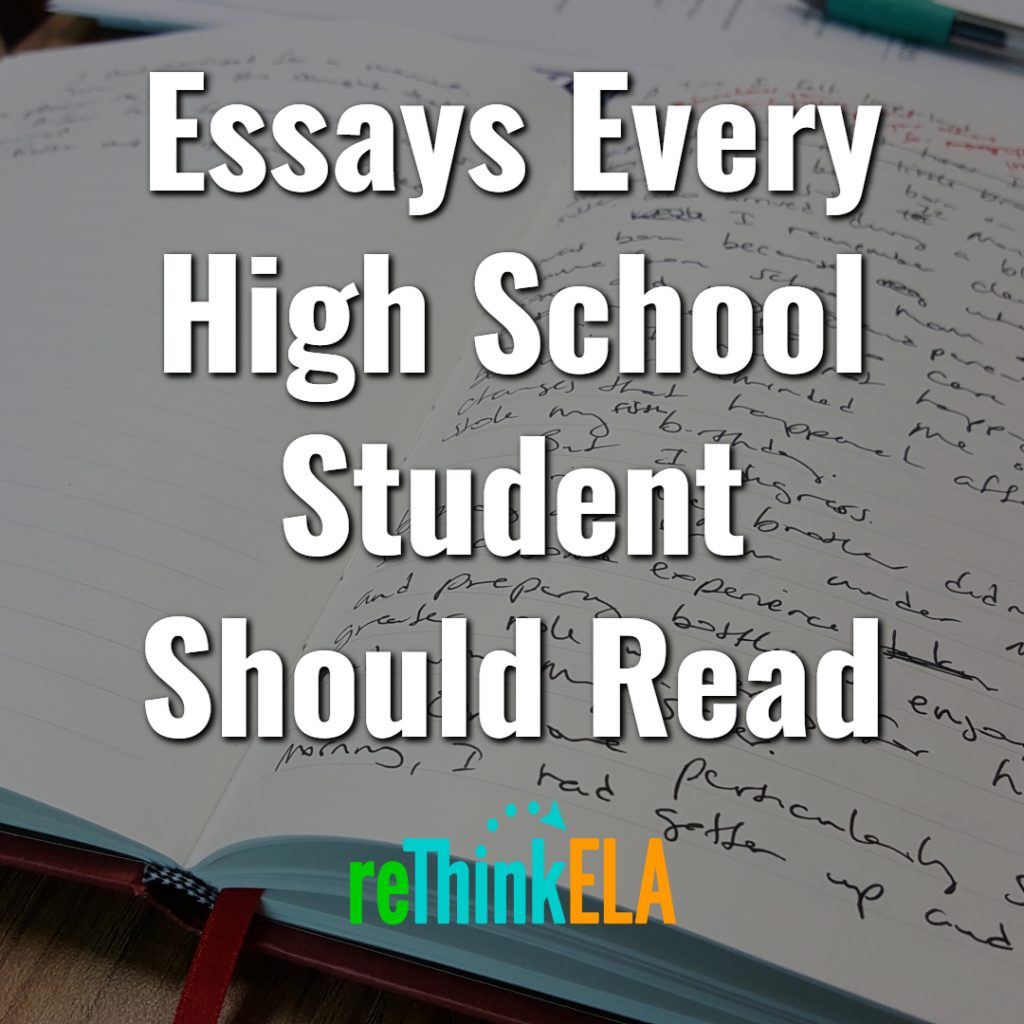
One of the most important goals of any English class should be to help students learn how to express themselves to an audience — how to tell their own stories, how to provide much-needed information, and how to convince others to see things from a different perspective.
Below are some essays students can read, not only to help them see how such writing is done in the real world, but also to learn more about the world around them.
[bctt tweet=”Need a #mentortext for student essays? Check out these exemplars for personal narrative, argumentative, and expository essay writing.”]
Note : This is a living list. I will continue adding to it as I find important essays and articles, and as my readers make suggestions.
If You Think Racism Doesn’t Exist by Jordan Womack | Lesson Plan
A 17-year-old Oklahoma author details incidents of discrimination he has faced within his own community. Brief, yet impactful, the author’s authenticity strikes readers at their core and naturally leads the audience to consider other perspectives.
Facebook hack ‘worse than when my house burned down’ says teacher by Michelle Boyd Waters, M.Ed.
When a hacker destroyed my Facebook account and I couldn’t find a way to reach out to Facebook, I decided to use my story, voice, and platform to shed light on a situation faced by people around the world. This can serve as a mentor text for students writing personal narratives on shared experiences in the context of current events.
Letter from a Vietnamese to an Iraqi Refugee by Andrew Lam
Vietnamese lecturer, journalist, and author Andrew Lam offers advice in this letter to a young Iraqi refugee he sees in a photograph on the Internet.
Allowing Teenage Boys to Love Their Friends by Jan Hoffman
Learn why early and lifelong friendships are as vital for boys as they are for girls and what happens when those friendships are fractured.
Chris Cecil: Plagiarism Gets You Fired by Leonard Pitts Jr
The Miami Herald columnist and 2004 Pulitzer Prize for Commentary winner castigates a Georgia newspaper editor for plagiarizing his work. This column would go great with this followup article from The Boston Globe: Ga. Editor is Fired for Lifting Columns .
Class Dismissed by Walter Kirn
The author of Lost in the Meritocracy postulates that getting rid of the high school senior year might be good for students.
Complaint Box | Packaging by Dylan Quinn
A high school junior complains about the impossible-to-open packaging faced by consumers of everything “from action figures to zip drives.”
Drowning in Dishes, but Finding a Home by Danial Adkison
In this 2014 essay, a teenager learns important lessons from his boss at Pizza Hut.
How to Tame a Wild Tongue by Gloria Anzaldua
An American scholar of Chicana cultural theory discusses how she maintained her identity by refusing to submit to linguistic terrorism.
Humble Beast: Samaje Perine by John Rohde
The five-time Oklahoma Sportswriter of the Year features the University of Oklahoma’s running back.
In Praise of the F Word by Mary Sherry
An adult literacy program teacher argues that allowing students to fail will actually help them.
The Joy of Reading and Writing: Superman and Me by Sherman Alexie
A Native American novelist recounts his experience loving reading and finally writing in spite of a culture that expected him to fail in the “non-Indian world” in order to be accepted.
Lane’s Legacy: One Final Ride by Keith Ryan Cartwright
A heartbreaking look back at the hours before and the circumstances surrounding Lane Frost’s untimely death, followed by reflections on his rise to fame — before and after death.
Learning to Read by Malcolm X
The 1960s Civil Rights leader writes about how educating himself in prison opened his mind and lead him to become one of the leading spokesmen for black separatism.
Learning to Read and Write by Frederick Douglass
A former slave born in 1818 discusses how he learned to read in spite of laws against teaching slaves and how reading opened his eyes to his “wretched condition, without remedy.”
Learning From Animal Friendships by Erica Goode
Scientists consider studying the phenomenon of cross-species animal friendships like the ones you see on YouTube.
Losing Everything, Except What Really Matters by Dan Barry
After a 2011 tornado destroys a house, but spares the family, a reporter writes about what’s important.
The Marked Woman by David Grann
How an Osage Indian family in Oklahoma became the prime target of one of the most sinister crimes in American history.
Meet Mikey, 8: U.S. Has Him on Watch List by Lizette Alvarez
Read about what happens if you happen to share a name of a “suspicious person” on the U.S. No-Fly List.
Newly Homeless in Japan Re-Establish Order Amid Chaos by Michael Wines
After the tsunami that resulted in nuclear disaster in 2011, a reporter writes about the “quiet bravery in the face of tragedy” of the Japanese people.
No Ordinary Joe by Rick Reilly
Why in creation did American Football Conference’s 1981 best young running back Joe Delaney jump into that pit full of water that day, even though he couldn’t swim?
Politics and the English Language By George Orwell
Animal Farm and 1984 author, Orwell correlates the degradation of the English language into multi-syllabic drivel and the corruption of the American political process.
Serving in Florida by Barbara Ehrenreich
The Nickel and Dimed: On (Not) Getting By in America author tells about her experiences attempting to survive on income of low-paying jobs.
Starvation Under the Orange Trees by John Steinbeck
John Steinbeck, who later authored the fictionalized account of Okies in California, The Grapes of Wrath, first wrote this essay documenting the starvation of migrant workers in California during the Great Depression.
To Fall in Love With Anyone, Do This by Mandy Len Catron
Is falling in love really a random event, or can two people “love smarter?”
We’ll Go Forward from this Moment by Leonard Pitts
The 2004 Pulitzer Prize for Commentary winner pens a column chronicling the toughness of the American family’s spirit in the face of the September 11, 2001 World Trade Center attacks. He wrote the column one day after the attacks.
What’s Wrong with Black English? by Rachel L. Jones
Jones, a student at Southern Illinois University in the 1980s, wrote this piece for Newsweek. In her essay, Jones adds her story and perspective to the debate over Black English.
Related topics: Mentor Texts , Teaching Writing
About the author
Michelle Boyd Waters, M.Ed.
I am a secondary English Language Arts teacher, a University of Oklahoma student working on my doctorate in Instructional Leadership and Academic Curriculum with an concentration in English Education and co-Editor of the Oklahoma English Journal. I am constantly seeking ways to amplify students' voices and choices.
A wonderful list of essays! I have neglected to teach essays as literature (only as student writing samples before we began work on an essay, after a novel). I’m looking forward to using these!
Thank you very much! I’d love to hear (or read) your feedback on the selections. Your input can help other teachers decide which essays to teach their students.
This list looks really great. Unfortunately, the first two links I chose were not working. One took me to a professors homepage and the other never opened.
Thank you for letting us know. I checked the “If you think racism doesn’t exist” went to the WordPress.com site where the author wrote his article and “Letter from a Vietnamese to an Iraqi Refugee” went to the Huffington Post article. Is it possible that your school web filter is blocking WordPress and Huffington Post?
Thank you for this. I am teaching a summer class that prepares 8th graders for high school essay writing. Trying to find a way to make it more creative and interesting, even interactive. I like the essays. If you have ideas about specific ways to use them, beyond reading and discussion, I would love to hear them.
You’re welcome! I think additional activities would depend on who your students are, their interests, and which essay(s) you plan to use. Perhaps if you join our RTE Facebook group and tell us about your kids and the essay you want to use, we can devise some activities to help them engage. Check us out here .
Comments are closed.
+1 (603) 932 7897

- 5 Common Types of High School Essays (With Examples)
- Last modified 2024-04-01
- Published on 2021-08-28
When it comes to high school essays, descriptive and narrative essays are very similar in the sense that they encourage writers to be creative in expressing their ideas. Expository and argumentative essays focus on providing clear information and making compelling points. Analytical essays require writers to present their arguments and are intended to enhance readers’ understanding of a topic, while persuasive writers try to persuade readers to accept a point of view.
In this article, we will go into detail about each one to help you better define the type and the writing method when you start writing.
1. Descriptive high school essays
A descriptive essay asks writers to describe something vividly —object, person, place, experience, emotion, situation, etc., but more commonly, you will be asked to describe something abstract —emotions, experiences, or something outside of your typical experience.
A descriptive essay allows writers to be creative and have the freedom to express, especially when the topic is personal about them and what they care about, such as their favorite food or culture. Even though this sounds easy, this type of essay tests the writer’s ability to make appropriate word choices and have strong creativity to help readers visualize the overall picture of what they are writing about. A descriptive essay normally starts with introducing the subject or object of description, continuing with giving an overall picture, and then going into details. Additionally, understanding different points of view, as detailed in the Guide to Point of View in Writing , can greatly enhance the descriptive elements of the essay, providing varied perspectives and enriching the reader’s experience
Below is an example of a descriptive essay from Yourdictionary :
I watched a thunderstorm, far out over the sea. It began quietly, and with nothing visible except tall dark clouds and a rolling tide. There was just a soft murmur of thunder as I watched the horizon from my balcony. Over the next few minutes, the clouds closed and reflected lightning set the rippling ocean aglow. The thunderheads had covered up the sun, shadowing the vista. It was peaceful for a long time.
I was looking up when the first clear thunderbolt struck. It blazed against the sky and sea; I could see its shape in perfect reverse colors when I blinked. More followed. The thunder rumbled and stuttered as if it could hardly keep up. There were openings in the cloud now, as if the sky were torn, and spots of brilliant blue shone above the shadowed sea.
I looked down then, watching the waves. Every bolt was answered by a moment of spreading light on the surface. The waves were getting rough, rising high and crashing hard enough that I could hear them.
Then came the rain. It came all at once and in sheets, soaking the sand, filling the sea. It was so dense I could only see the lightning as flashes of light. It came down so hard the thunder was drowned. Everything was rhythmic light and shadow, noise and silence, blending into a single experience of all five senses.
In an instant it stopped. The storm broke. The clouds came apart like curtains. The rain still fell, but softly now. It was as if there had never been a storm at all, except for a single signature. A rainbow, almost violently bright, spread above and across the water. I could see the horizon again.
2. Narrative Essay
A narrative high school essay is similar to a descriptive essay but focuses more on the story description rather than the object description. The story can be about a personal experience that the writer has had, an event, a story, or an incident. Writers can even narrate a fictional experience that they haven’t had. Narrative essays are typically written in the first person. For example, the personal statement high school students must write for college applications.
The purpose of a narrative essay is not only to tell a story, but also to highlight the importance of the experience. Therefore, to write a perfect narrative essay, writers must include the elements of settings, context, plot, ending, and climax.
We have an example from a student’s work, which was published on the blog: People’s Republic of Creativity
Glup, glup.
I sat watching the plunger slowly make its way down the tube and into Miriam’s body. Inside the tube was a clear unknown liquid that would soon be injected into my own body. This was the third time this week, the twelfth time this month, and who knows how many times since we have been trapped in this hell on earth. Each day, we have only been given the bare minimum of food, water, and sleep. I don’t know how much longer we can survive before deemed useless by him.
Miriam fell out of her chair and onto the cold concrete floor, screaming in pain. She scrambles for something she can grasp onto to prop her malnourished body up. Then the piercing sound just suddenly stopped. Her thin arms that look only of bones and skin drop to the ground and she lay still on the floor, as if she were…dead. Please don’t tell me she’s dead! No, she couldn’t be; we promised each other to live until the day of liberation.
She needs to live.
It was my turn. He walked over with a syringe full of what had just been injected into Miriam. I try to focus on the red, black, and white badge on his left arm instead of letting the fear crawl in and take over my brain. But the unsettling tension stirs my thoughts around and around.
“Twin A1387, let’s hope what happened to your sister doesn’t happen to you.” He smirked. The needle pierced through my skin and my body was suddenly aflame. The raging blaze spread through every one of my veins, until I was shrouded in darkness.
When I opened my eyes again, I found myself in an empty confinement. The space next to me, the space for Miriam, was empty too. Where was everyone? Most importantly, where was Miriam?
I got up and set my bare foot onto the dirty, wooden floor. Suddenly, my head started spinning and along with it, the world spun too. I fell to the ground, and when I could finally lift my head, what I saw above me terrified me. It was him, death in human form, and beside him were four of his helpers. They grabbed my arms and forced me to stand up.
“Good morning A1387. I am afraid your dear twin sister couldn’t handle the injections from yesterday. Let’s hope your fragile little limbs can endure those chemicals. I wonder how many more injections it will take for you to meet your pathetic sister,” he said, patting my head. His tone was playful, but deadly.
I froze. What? Miriam…dead? That one word, “twins”, has taken away everything of what feels like my past life, and now my last hope? I felt a surge of anger, hatred, sadness, fear, devastation swirling inside me like boiling lava in a volcano, ready to erupt. I wanted to scream, to shout, to kill him, but I couldn’t. My soft limbs felt as if they would collapse merely by trying to stand up. They would be harmless and defenceless against the Angel of Death. When he saw the hatred on my face, he started laughing hysterically and simply said, “What a shame; she was only 13. I cannot wait to see how long it will take for you to fall apart!”
3. Expository Essay
According to Purdue University , the expository essay is a genre of essay that requires the student to investigate an idea, evaluate evidence, expound on the idea, and set forth an argument concerning that idea in a clear and concise manner. To accomplish this, writers use the method of comparison and contrast, definition, example, cause and effect, etc.
Writers are not required to argue or make a personal opinion but to present balanced and well-organized facts and figures.
In an expository essay–as the name suggests–you need to expose the particular subject in question by providing enough information. It is an informative piece of writing that provides a balanced analysis of the topic. It does not contain any personal opinion; instead, it is based on real facts and figures. Therefore, this kind of high school essay is commonly assigned in high school or college in order to test students’ familiarity with a topic and ability to convey information.
This is an example from College Board’s SAT Writing Prompt.
In response to our world’s growing reliance on artificial light, writer Paul Bogard argues that natural darkness should be preserved in his article “Let There be dark”. He effectively builds his argument by using a personal anecdote, allusions to art and history, and rhetorical questions.
Bogard starts his article off by recounting a personal story – a summer spent on a Minnesota lake where there was “woods so dark that [his] hands disappeared before [his] eyes.” In telling this brief anecdote, Bogard challenges the audience to remember a time where they could fully amass themselves in natural darkness void of artificial light. By drawing in his readers with a personal encounter about night darkness, the author means to establish the potential for beauty, glamour, and awe-inspiring mystery that genuine darkness can possess. He builds his argument for the preservation of natural darkness by reminiscing for his readers a first-hand encounter that proves the “irreplaceable value of darkness.” This anecdote provides a baseline of sorts for readers to find credence with the author’s claims.
Bogard’s argument is also furthered by his use of allusion to art – Van Gogh’s “Starry Night” – and modern history – Paris’ reputation as “The City of Light”. By first referencing “Starry Night”, a painting generally considered to be undoubtedly beautiful, Bogard establishes that the natural magnificence of stars in a dark sky is definite. A world absent of excess artificial light could potentially hold the key to a grand, glorious night sky like Van Gogh’s according to the writer. This urges the readers to weigh the disadvantages of our world consumed by unnatural, vapid lighting. Furthermore, Bogard’s alludes to Paris as “the famed ‘city of light’”. He then goes on to state how Paris has taken steps to exercise more sustainable lighting practices. By doing this, Bogard creates a dichotomy between Paris’ traditionally alluded-to name and the reality of what Paris is becoming – no longer “the city of light”, but moreso “the city of light…before 2 AM”. This furthers his line of argumentation because it shows how steps can be and are being taken to preserve natural darkness. It shows that even a city that is literally famous for being constantly lit can practically address light pollution in a manner that preserves the beauty of both the city itself and the universe as a whole.
Finally, Bogard makes subtle yet efficient use of rhetorical questioning to persuade his audience that natural darkness preservation is essential. He asks the readers to consider “what the vision of the night sky might inspire in each of us, in our children or grandchildren?” in a way that brutally plays to each of our emotions. By asking this question, Bogard draws out heartfelt ponderance from his readers about the affecting power of an untainted night sky. This rhetorical question tugs at the readers’ heartstrings; while the reader may have seen an unobscured night skyline before, the possibility that their child or grandchild will never get the chance sways them to see as Bogard sees. This strategy is definitively an appeal to pathos, forcing the audience to directly face an emotionally-charged inquiry that will surely spur some kind of response. By doing this, Bogard develops his argument, adding gutthral power to the idea that the issue of maintaining natural darkness is relevant and multifaceted.
Writing as a reaction to his disappointment that artificial light has largely permeated the presence of natural darkness, Paul Bogard argues that we must preserve true, unaffected darkness. He builds this claim by making use of a personal anecdote, allusions, and rhetorical questioning.
4. Argumentative Essay
The argumentative high school essay is similar to the expository essay, because it requires writers to present their evidence-based arguments. Writers have to present a thesis statement, gather and evaluate evidence, and establish a position on the topic. Many people think argumentative and expository essays are the same. They belong to a similar genre, but an argumentative essay requires more research than an expository essay. An expository essay is normally used in the SAT test, because test takers are required to investigate and present points from the prompts given. An argumentative essay is generally used in a final project or a capstone, which requires length and detailed research. The essay is divided into 3 parts: introduction, body, and conclusion. The introduction has a topic and thesis statement, the body has evidence and arguments, and the conclusion summarizes the arguments and potential directions for future research.
Below is an example from a GRE writing answer from ETS :
Prompt : The best ideas arise from a passionate interest in commonplace things
Discuss the extent to which you agree or disagree with the statement above and explain your reasoning for the position you take. In developing and supporting your position, you should consider ways in which the statement might or might not hold true and explain how those considerations shape your position.
Passion is clearly necessary for a truly great idea to take hold among a people—passion either
on the part of the original thinker, the audience, or ideally both. The claim that the most lucrative
subject matter for inspiring great ideas is “commonplace things” may seem initially to be counterintuitive. After all, aren’t great ideas usually marked by their extraordinary character? While this is true, their extraordinary character is as often as not directly derived from their insight into things that had theretofore gone unquestioned. While great ideas certainly can arise through seemingly pure innovation… say, for example, Big Bang cosmology, which developed nearly all of its own scientific and philosophical precepts through its own process of formation, it is nevertheless equally true that such groundbreaking thought was, and is, still largely
a reevaluation of previous assumptions to a radical degree… after all, the question of the ultimate nature of the universe, and man’s place in it, has been central to human thought since the dawn of time. Commonplace things are, additionally, necessary as material for the generation of “the best ideas” since certainly the success among an audience must be considered in evaluating the significance and quality of an idea.
The advent of Big Bang cosmology, which occurred in rudimentary form almost immediately upon Edwin Hubble’s first observations at the Hooker telescope in California during the early 20th century, was the most significant advance in mankind’s understanding of the universe in over 400 years. The seemingly simple fact that everything in the universe, on a very large scale, is moving away from everything else in fact betrays nearly all of our scientific knowledge of the origins and mechanics of the universe. This slight, one might even say commonplace, distortion of tint on a handful of photographic plates carried with it the greatest challenge to Man’s general, often religiously reinforced, conception of the nature of the world to an extent not seen since the days of Galileo. Not even Charles Darwin’s theory, though it created more of a stir than Big Bang cosmology, had such shattering implications for our conceptions of the nature of our reality. Yet it is not significant because it introduced the question of the nature of what lies beyond Man’s grasp. A tremendous number of megalithic ruins, including the Pyramids both of Mexico and Egypt, Stonehenge, and others, indicate that this question has been foremost on humankind’s collective mind since time immemorial. Big Bang cosmology is so incredibly significant in this line of reasoning exactly because of the degree to which it changed the direction of this generally held, constantly pondered, and very ancient train of thought.
Additionally, there is a diachronic significance to the advent of Big Bang cosmology, which is that, disregarding limitations such as the quality of optical devices available and the state of theoretical math, it could have happened at any point in time. That is to say, all evidence points to roughly the same raw intellectual capacity for homo sapiens throughout our history, our progress has merely depended upon the degree of it that a person happens to inherit, a pace that has been increasing rapidly since the industrial revolution. Yet this discovery had to happen at a certain point in time or another—it cannot have been happening constantly or have never happened yet still be present—and this point in time does have its own significance. That significance is precisely the fact that the aforementioned advent must have occurred at precisely the point in time at which it truly could have occurred—that is to say, it marks the point in our history when we had progressed sufficiently to begin examining, with remarkable substantiated acuity, the workings of the universe across distances that would take millions of human lifetimes to reach or to traverse. The point for the success of this advent must necessarily have been, additionally, the point at which the audience concerned was capable and prepared to accept such a radical line of reasoning.
Both factors, a radical, passionate interpretation of the commonplace and the preparedness to accept such an interpretation, are necessary for the formulation of a truly great idea. If the passion is absent from an inquiry by the thinker or by the bulk of an audience, the idea will die out if it comes to fruition at all. If the material is not sufficiently commonplace to be considered by an informed audience of sufficient size, the same two hazards exist. Given these two factors, the idea must still be found palatable and interesting by the audience if it is to hope to gain a foothold and eventually establish itself in a significant fashion.
5. Analytical Essay
An analytical essay is a writing genre that provides an in-depth analysis of a topic, ranging from art, music, and literary text to politics, science, and philosophy, etc. Analytical essays can boost a writer’s writing skills and overall comprehension of a topic while helping readers become more educated about the subjects of importance. This type of essay does not aim to persuade readers to a certain point of view but rather to provide a well-rounded and comprehensive analysis for the readers. The analytical essay is normally used in the GRE writing section.
A good analytical essay includes a thesis statement stating your main argument, followed by an analysis of your thesis and supporting evidence. Here are the 7 Steps to Write a Literary Analysis Essay .
We will take an example from a student’s work about CRISPR, a genetic engineering method. The full essay can be accessed here , but below is the preview of the essay:
No matter how much money people are willing to pay for health care, they may still suffer terribly from incurable diseases such as AIDS and cancer because of the underdevelopment of medical technology. However, today, the advancement in human knowledge has led to the introduction of human gene-editing, turning impossibility to possibility. In particular, the recent technology for genome editing called CRISPR has been having a groundbreaking impact on research in genetic science. This is due to its remarkable potential to simply cure genetic diseases in an embryo before they have a serious effect on further developmental progression. Although currently, there have been numerous debates regarding its extension in research for widespread uses, CRISPR is a completely promising technology because of the benefits it brings to people.
CRISPR, or Clustered regularly interspaced short palindromic repeats, is the newest innovation in genetic engineering. The way CRISPR works is similar to “the scissor-like action of Cas 9 to target… any specific DNA sequence” (Baylis and Rossant). By making cuts in specific locations in DNA, CRISPR can cure diseases and make alterations in an embryo’s DNA, which prevent diseases from being passed down to following generations (Baylis and Rossant). Throughout the history, governments and researchers came up with different approaches politically and scientifically in attempt to control population. They hoped to encourage the “richest, wisest and healthiest to breed like rabbits” and the “sick, stupid, and poor to take one for the empire and remain childless” (Comfort 28). The second attempt happened during the 20th century, when the U.S government passed the law preventing marriage and immigration that would threaten a perceived core American “stock.” Another more extreme example was when Nazi sterilization law further advanced this population control approach. Later in the century, a biotechnological approach was established as a safer and more humane way to manage population health (qtd in Comfort 28). “Gene surgery,” which is similar to CRISPR technology, was established and followed by contentious debates regarding ethical issues between disease treatment and human trait enhancements. Currently, there has been a halt in the use of CRISPR because of the increase in concern from the public about the pros and cons of this technology.
Further reading:
- Where to Submit Your Writing Works: 5 Main Platforms
- 6 Differences between High School and College Writing
- 20 Tips to Improve Your Writing
- Guide to Point of View in Writing
- 10 Mistakes High School Students Make in Creative Writing
- How to Overcome Writer’s Block in High School Writing Competitions
Aralia Writing Courses

This class is offered in the summer every year. Students from 13 to 18 years old wanting to learn how to shape their written English into effective and publishable creative pieces will find this particular Writing Competition course very exciting. The class will be shown a range of tools to learn the nuances of controlled, purposeful writing, including: figurative language, effective structuring and specific forms that they will apply to their own pieces.

This course helps students develop and improve their writing skills to prepare students for higher education courses. The methodology emphasizes the ability to read critically, think critically, and write critically. Students will learn informative, narrative, descriptive, creative, and persuasive essay writing skills. Students will learn how to brainstorm, structure and outline, form an argument, defend it, incorporate academic sources, and develop a clear, articulate writing style. The focus will be on the writing process, intended audience, consistent tenses, point of view, correct grammar uses, building vocabulary, appropriate style, and proper research and citation protocols.
- Academic Tips

Aralia Education is an innovative online education platform for ambitious middle and high school students worldwide. Aralia’s instructors propel students forward by helping them build a strong foundation in traditional academic courses. They also actively engage and guide students in exploring personal interests beyond their school curriculum. With this holistic approach, Aralia ensures its students are well-prepared for college and equipped for success in their future careers.
- College Accelerator Program
- Comprehensive Introduction to High School
- Academic Empowerment Program
- Test Preparation Bootcamp
- Private Lessons
- Student Awards
- Competitions
Give us a call: +1 (603) 932 7897
Email us: [email protected]
Add us on WhatsApp:


- What is Homeschooling?
- But Am I Qualified?
- School Closures
- TryHomeschooling.com
- Am I Qualified to Homeschool?
- Considering Homeschooling?
- Hey, Mama! Homeschool Show
- THM Archives
- Need a Speaker?
- Schoolhouse Devotions
- Annual Freebie Directory
- Resource Guide
- Spotlight on Academics
- Homeschool College Directory
- HomeschoolingFinds.com
- Homeschool Help and Articles
- Excellence Awards
- National Academic Homeschool Competition
- Support Group Leaders
- Schoolhouse Ambassadors
- SchoolhouseTeachers.com
- Read the back issues HERE
- Read the current issue of The Old Schoolhouse® Magazine
- Get the Homeschool App–Start Here to Homeschool
- You Are Not Alone digital magazine supplement
- From ABC’s to SAT’s – Summer 2019 Digital Supplement
- Magazine Columnists
- Magazine FAQ
- Writer’s Guidelines and Upcoming Themes
- How to Write for TOS
- Terms and Conditions for Writers
- How to Submit a Query
- Advertise With Us
- Homeschool Stats
- Privacy Policy
- Terms of Use
- Statement of Faith
- Mission Statement
- Testimonials
- Gena Suarez and Our Story
- Advertising
- Customer Service
- The Homeschool Minute
- Website Admins
- Our Sponsors
- The Curriculum
- Homeschooling with Heart Blog
- Our Blog Writers
- Try Homeschooling
- TheHomeschoolMinute.com
- HomeschoolingFinds
- SchoolhouseConnect.com
- Sell to Homeschoolers
- Mobile Apps
- Homeschool Store
- Track your order
How to Grade a High School Essay

Share this post:

I always struggled with grading my children’s writing, especially essays. If they had something good to say, I complimented and praised with delight, then tended to focus on their grammar and spelling. Well, that changed when I taught an essay course with my oldest daughter. She is an amazing teacher with a Master’s degree in English and experience teaching freshman English at UCF.
Be Positive
I was sharing my weakness in grading with my younger daughter’s creative writing professor at a recent wedding. He encouraged me by saying that studies have shown that positive feedback is the number one factor in children excelling at writing. That made me so happy that I had been so positive with my children’s writing. So, I pass that on to you. Be upbeat, positive, and full of true praise when you talk about their writing.
“I love the illustrations you used here! They are so creative!”
“Wow! That is a great quote.”
“I love your writing style.”
Tell them in person. Write notes on their paper. I used lots of smileys.
Now, onto actual grading. Grading’s purpose is always to help them become better writers. We always rewrite papers at least once. Here are the things to examine when grading.
Step back from the paper, ignoring the grammar and spelling. Does the paper say something that is interesting and valuable? If you know what teens are trying to say, you can help them to say it more effectively.
Readability
Is the paper interesting and readable? Does it make you want to read more? Are the sentences well-written? Are concrete words used to make the meaning clear? Is your young writer concise or do they ramble on and on?

Thesis Statement
The thesis statement is the cornerstone of the essay. It reveals the purpose of the papers and guides each paragraph.
Does the thesis make a provable point or is it too vague?
Thesis Statement & Each Paragraph
Does the thesis statement guide the paper so that each paragraph relates to the thesis statement?
I like to teach my teens to write a thesis statement that is very specific so that the paper easily follows by matching it.
Here is an example.
Dogs make better pets than cats because they come when you call, are easier to train, and like to ride in a car.
Paragraph one will be the introduction, paragraph two about dogs responding to their owner’s call, paragraph three showing dogs are easier to train, paragraph four proving dogs enjoy car rides and why that makes them a good pet, and finally, in the fifth paragraph, the conclusion.
Flow of Essay
The next thing to examine is the flow of the paper. Can you follow the argument? Does it transition well from one paragraph to another or are you lost? Are the points shared in a logical way?
Is the thesis introduced in the introduction?
Are quotes introduced in a way that they make sense to the reader?
Is the thesis restated and the reader called to action in the final paragraph?
Grammar & Spelling
Though poor grammar and spelling are the most irritating to me when I grade a paper, they are really less important than the true writing in the paper. I always have the kids correct their mistakes, but it is less than 10% of their final grade.
Here is an example of how to break down the grading:
- Content 20%
- Readability 15%
- Thesis Statement 20%
- Thesis Statement and each paragraph 20%
- Flow of essay 15%
- Grammar and spelling 10%
You will notice I grade heavily on the thesis statement and content.
Please share how you grade your teens’ essays so we can all learn from one another.
More Help with Writing
Turn an Essay into a Blog Post
How I Teach English in High School
Until next time, Happy Homeschooling,
Meredith Curtis
Meredith Curtis , homeschooling mom, writer, speaker, and publisher, loves to encourage families in their homeschooling adventure. She is the author of Communication 101: Essays & Speeches , American Literature & Research , and Who Dun It Mystery Literature & Writing Course (all high school one-credit English courses) . You can check out her books, curricula, unit studies, and Bible studies at PowerlineProd.com . Free Reading Lists for all ages are available at JSHomeschooling.com . Read her blogs at MeredithCurtis.com ( http://www.meredithcurtis.com/blog ) and PowerlineProd.com and listen to her podcast at Finish Well Radio

Leave a Reply Cancel reply
Your email address will not be published. Required fields are marked *
Save my name, email, and website in this browser for the next time I comment.
This site uses Akismet to reduce spam. Learn how your comment data is processed .

SHARE TOS ON YOUR PAGE!
GRAB OUR BUTTON HERE-
HwH Blog Categories
What are your chances of acceptance?
Calculate for all schools, your chance of acceptance.
Your chancing factors
Extracurriculars.
50 Engaging Narrative Essay Topics for High Schoolers
Do you know how to improve your profile for college applications.
See how your profile ranks among thousands of other students using CollegeVine. Calculate your chances at your dream schools and learn what areas you need to improve right now — it only takes 3 minutes and it's 100% free.
Show me what areas I need to improve
What’s Covered:
Narrative essays vs. analytical essays, how to pick the right narrative essay topic, elements of a strong narrative essay, engaging narrative essay topics for high schoolers, where to get your narrative essay edited for free.
Narrative essays are an extensive form of writing that gives readers the opportunity to follow along as a person goes through a journey or sets of experiences. Rather than providing analytic insight, narrative essays simply share a story and offer a first-person account. These essays may seem easy to write at first, but it takes a certain finesse to write a narrative essay that is interesting, cohesive, and well-researched. Whether you’re looking for a unique topic to write about, or just want some new inspiration, CollegeVine is here to help! These 50 narrative essay topics are engaging, unique and will have you writing in no time.
A narrative essay is a great way to express your personal experiences and opinions, but it is important to remember that this type of essay is different from an analytical paper. In a narrative essay, you do not need to provide background information or explain your thoughts and feelings; instead, you simply tell a story. It’s important to avoid too much telling in your writing; instead, use creative details and vivid imagery to make readers feel as if they are actually right there with you.
Where You Will Encounter Narrative Essays
This type of essay is typically encountered in high school, where students may be required to write personal statements to prepare for their Common App essay . Narrative essays are also commonly seen in AP Language and Composition. Therefore, it’s important you are aware of the style because you are bound to have a narrative essay assignment.
Of course, before you start writing, it is important to pick the right essay topic. There are many factors involved in the process of picking the perfect narrative essay topic for your story.
You should always choose a topic that you are passionate about, since writing on something you care about will make the process much easier. Not only will it be more interesting to create your paper around something that truly interests you, but it will also allow you to fully express yourself in your essay. You also want to be sure that the topic has enough material to work with. If your chosen topic is too short, you will not have enough content to write a complete paper. For example, if you are writing about your experience getting lost at the mall, make sure that you have enough information to work with to craft an engaging narrative.
The best topic for an engaging narrative essay is one that focuses on showing versus telling, has a clear structure, and provides a dialogue. These elements come together to form an engaging narrative essay. Regardless of what subject you pick, any topic may be turned into a fascinating, A+ worthy narrative using the tips below.
Show, Don’t Tell
To write a good narrative essay, it’s important to show, not tell. Instead of simply informing your audience, show them what you mean. For example, instead of saying “I was nervous,” you could say “My heart began to race and my stomach filled with butterflies.” Also make sure to use sensory details, such as sights, sounds and tastes, and include a personal reflection at the end of your narrative.
Begin with a Strong Opening Line
A good narrative essay will begin with an attention-grabbing opening line. But make sure to avoid common clichés, such as “It was the best of times, it was the worst of times.” Instead, come up with something original and specific to you and your situation. For example: “My pre-calc teacher was obsessed with circles. I mean, he even used circular note cards.” Or, “It all started the day my mom brought home a guinea pig.”
Follows a Three-Act Structure
A strong narrative essay follows the same three-act structure as other essays. But in order to make it interesting, you’ll need to come up with a creative way to break things down into sections. For example, using the guinea pig example from above, you could write the following:
- Act 1 – Introduction: The day my mom brought home a guinea pig.
- Act 2 – Conflict: The day I had to say goodbye to my beloved pet.
- Act 3 – Conclusion: Looking back at how much I miss him now that he’s gone.
Conclude with Personal Reflection
To conclude your narrative essay, you’ll want to explain what this specific experience taught you or how you’ve changed. For example, upon realizing that her pre-calc teacher was obsessed with circles, the writer of the previous example begins to notice circular shapes everywhere. Another way to conclude your narrative essay is by touching on how this experience impacted you emotionally. For example, after losing his guinea pig, the writer explains how much he missed it.
Use Dialogue
Include a conversation in your essay to make it come alive. For example, instead of simply saying that you met a new friend, talk about how you introduced yourselves or what they were wearing when you met them.

Discover your chances at hundreds of schools
Our free chancing engine takes into account your history, background, test scores, and extracurricular activities to show you your real chances of admission—and how to improve them.
The following list of 50 narrative essay topics is divided into categories. This will make it easier to find a topic that fits your writing style.
1. What is a childhood song that still sticks with you today?
2. Your first day of Kindergarten
3. Talk about a time when you’re siblings looked up to you
4. Describe the best birthday party you’ve ever had
5. Talk about the best day you ever spent with a childhood friend
6. Explain your first childhood hobby
7. Describe your first halloween costume
8. A family vacation gone wrong
9. Your first family reunion
10. Describe a tradition that is unique to your family
11. Describe your family to a person who’s never met them before
12. What frustrates you most about your family
13. If you could only keep one memory of your family, what would it be and why?
14. Describe a time your family embarrassed you in public
15. The most beautiful place in the world
16. Your favorite season and why
17. If you were a part of nature, what element would you be? Why?
18. When you go outside, which of your senses are you most thankful to have?
19. Describe the first time you witnessed a tornado
20. Write a poem about your favorite season
21. Describe yourself as one of the four seasons
22. Describe a time in which you felt connected with nature
23. Describe the first time you played an instrument and how you felt
24. What major event would be much worse if music was removed, and why?
25. If you could only listen to one song for the rest of your life, what would it be and why?
26. What would a life without music look like?
27. If you could master one instrument, what would it be and why?
Relationships
28. What if you had never met your best friend?
29. Describe a time when you fixed a broken relationship
30. Talk about a movie that defined a relationship for you
31. Describe your first date
32. Describe the first time you made a friend
33. Describe your relationship with your parents

Self Reflection
34. Have you ever fooled someone? If so, describe what happened and how you felt about it
35. What is the worst thing you’ve done to someone else?
36. Write about the difference between how things seem and how they really are.
37. Have you ever been embarrassed in some way? If so, describe the situation and how it affected you as well as those around you
38. Have you ever witnessed something really beautiful? Describe it
39. Is your glass half empty or half full?
Overcoming Adversity
40. Have you ever been very afraid of something but tried your hardest to appear fearless? If so, describe that experience
41. When have you ever succeeded when you thought you might fail
42. What are your secret survival strategies?
43. Describe the last time you were stressed and why?
44. Describe a time when you were discriminated against
45. The most memorable class you’ve had and why
46. Your favorite study abroad memory
47. Describe your kindergarten classroom
48. Describe your first teacher
49. The first time you experienced detention
50. Your first field trip
Hopefully these topics will get you thinking about a personal experience that could make for a thoughtful and engaging narrative essay. Remember, a strong narrative essay must contain relatable details and a clear flow that keeps the reader entertained and engaged to read all the way to the end.
If you need some additional guidance on your narrative essay, use CollegeVine’s free peer review essay tool to get feedback for free!
Related CollegeVine Blog Posts

- Grades 6-12
- School Leaders
Win a $500 Oriental Trading Gift Card ✨
101 Interesting Persuasive Essay Topics for Kids and Teens
Use your words to sway the reader.
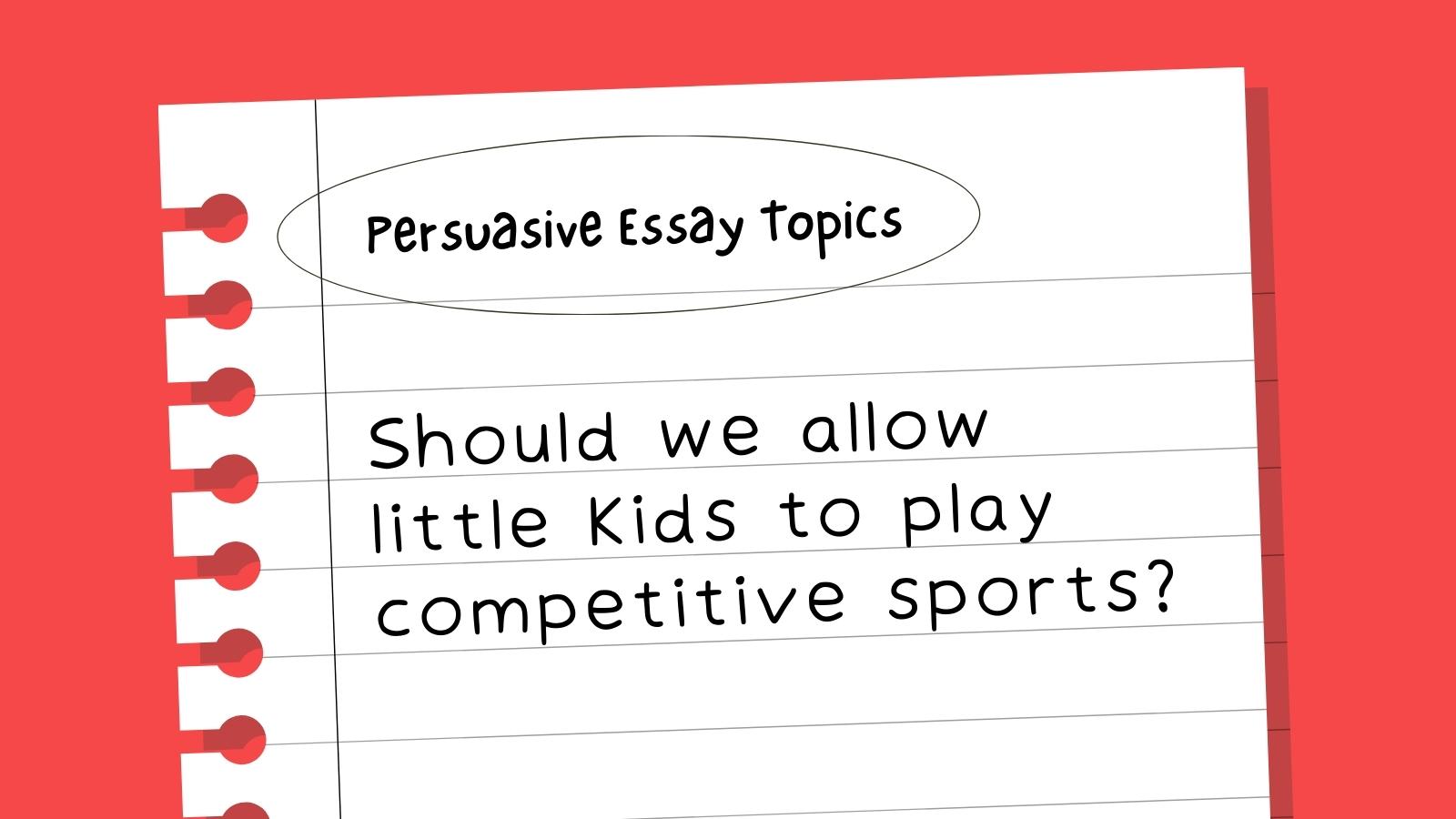
Persuasive writing is one of those skills that can help students succeed in real life. Persuasive essays are similar to argumentative , but they rely less on facts and more on emotion to sway the reader. It’s important to know your audience so you can anticipate any counterarguments they might make and try to overcome them. Try reading some mentor texts to show kids great examples of opinion writing. Then use these persuasive essay topics for practice.
School and Education Persuasive Essay Topics
Life and ethics persuasive essay topics, science and technology persuasive essay topics, sports and entertainment persuasive essay topics, just for fun persuasive essay topics.
- Do you think homework should be required, optional, or not given at all?

- Students should/should not be able to use their phones during the school day.
- Should schools have dress codes?
- If I could change one school rule, it would be …
- Is year-round school a good idea?
- Should we stop giving final exams?
- Is it better to be good at academics or good at sports?
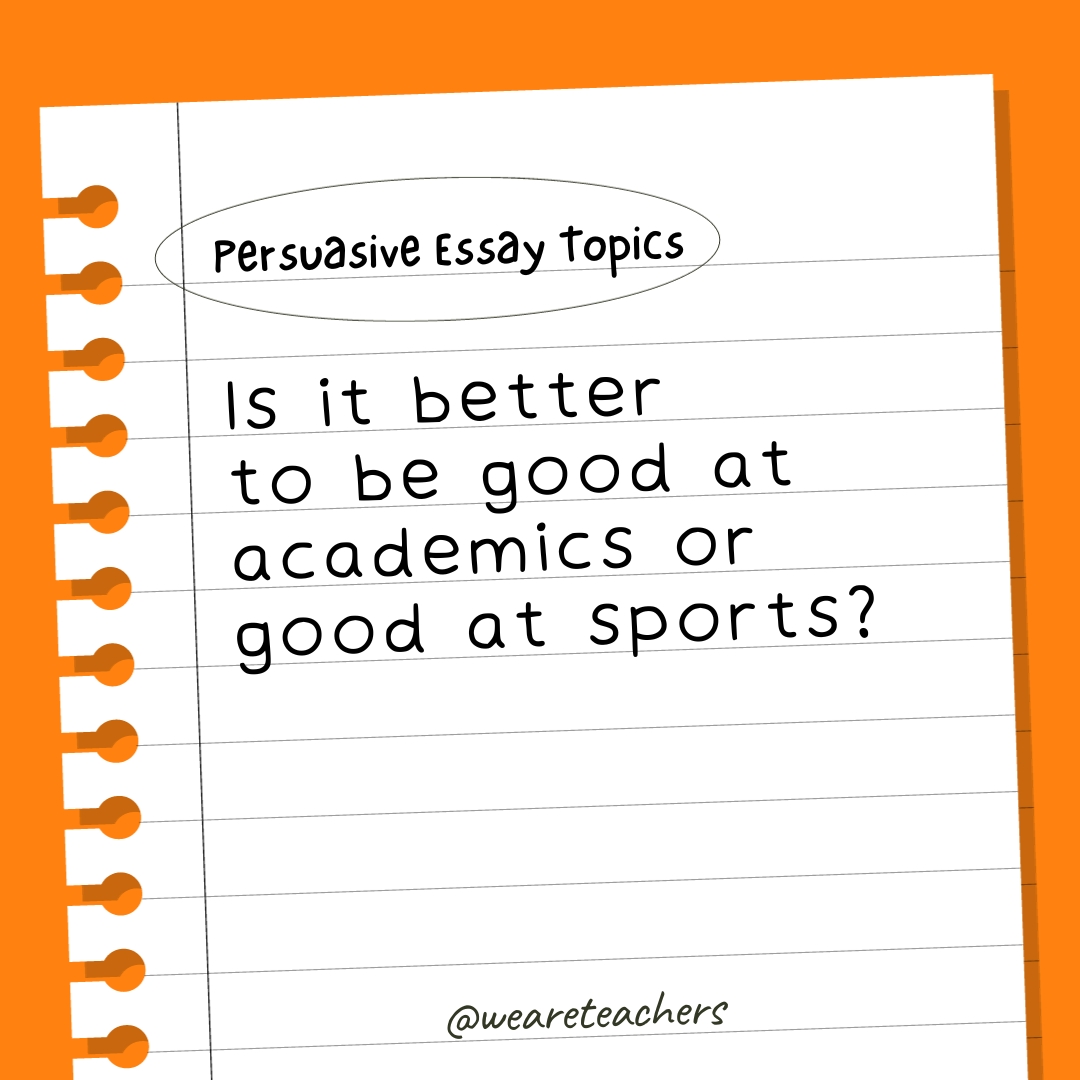
- Which is better, private schools or public schools?
- Should every student have to participate in athletics?
- Do you think schools should ban junk food from their cafeterias?
- Should students be required to volunteer in their communities?
- What is the most important school subject?
- Are letter grades helpful, or should we replace them with something else?
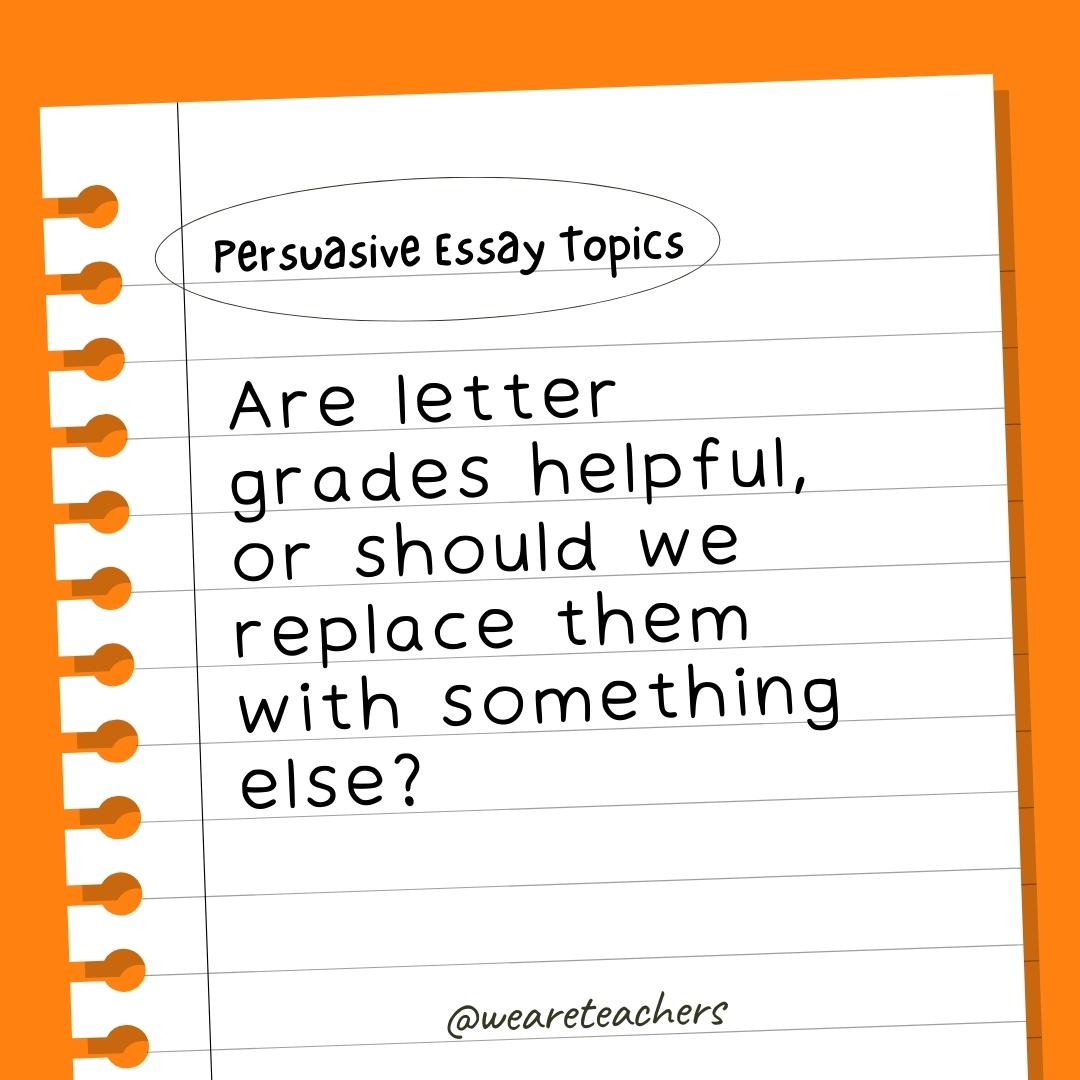
- Is it ever OK to cheat on homework or a test?
- Should students get to grade their teachers?
- Do you think college should be free for anyone who wants to attend?
- Should schools be allowed to ban some books from their libraries?
- Which is better, book smarts or street smarts?
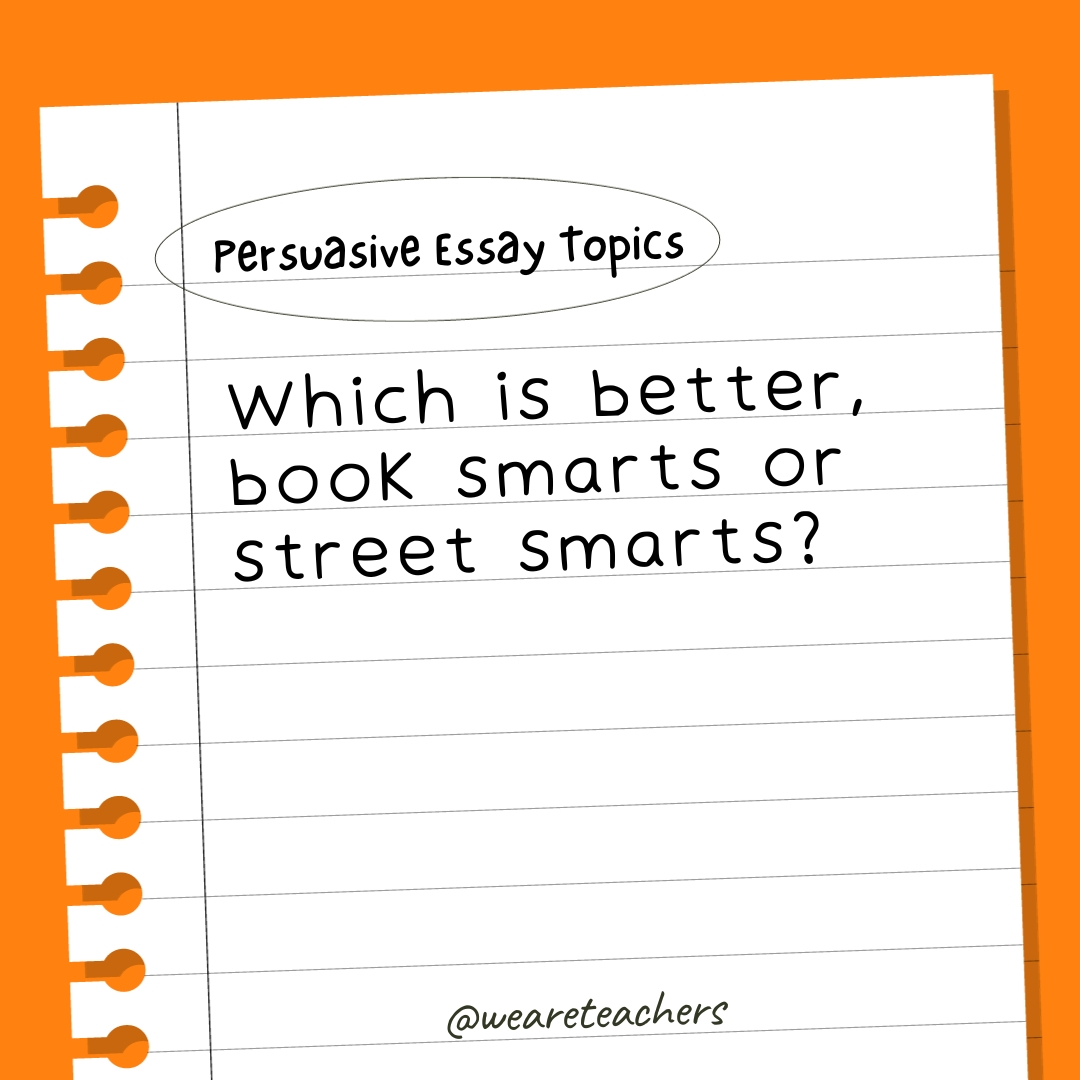
- Should all students have to learn a foreign language?
- Are single-gender schools better or worse for students?
- Is it OK to eat animals?
- What animal makes the best pet?
- Visit an animal shelter, choose an animal that needs a home, and write an essay persuading someone to adopt that animal.
- If you find money on the ground, should you try to find the person who lost it, or is it yours to keep?
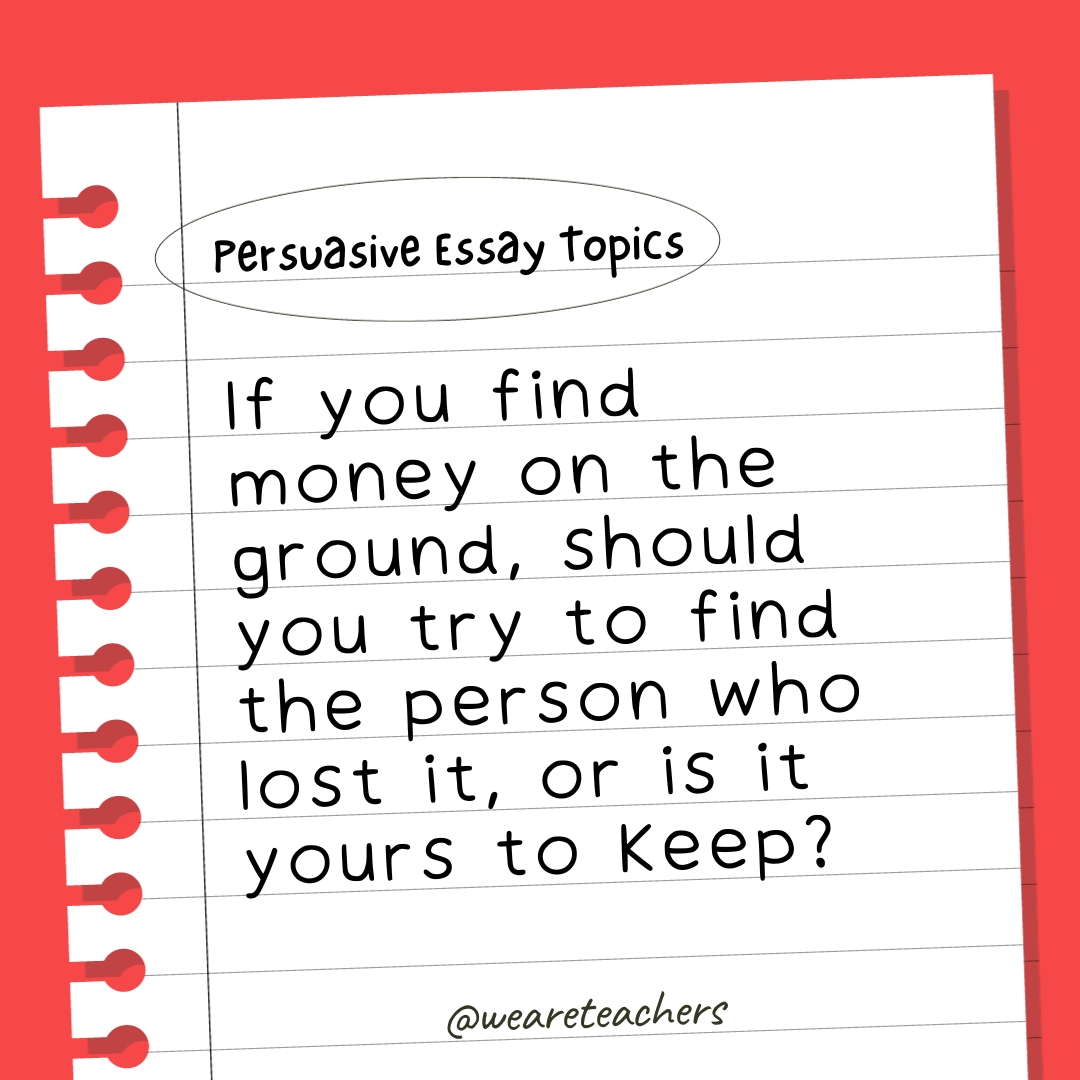
- Who faces more peer pressure, girls or boys?
- Should all Americans be required to vote?
- Is it better to be kind or truthful?
- Which is better, giving or receiving?
- Is it OK to keep animals in zoos?
- Should we change the minimum driving age in the United States?
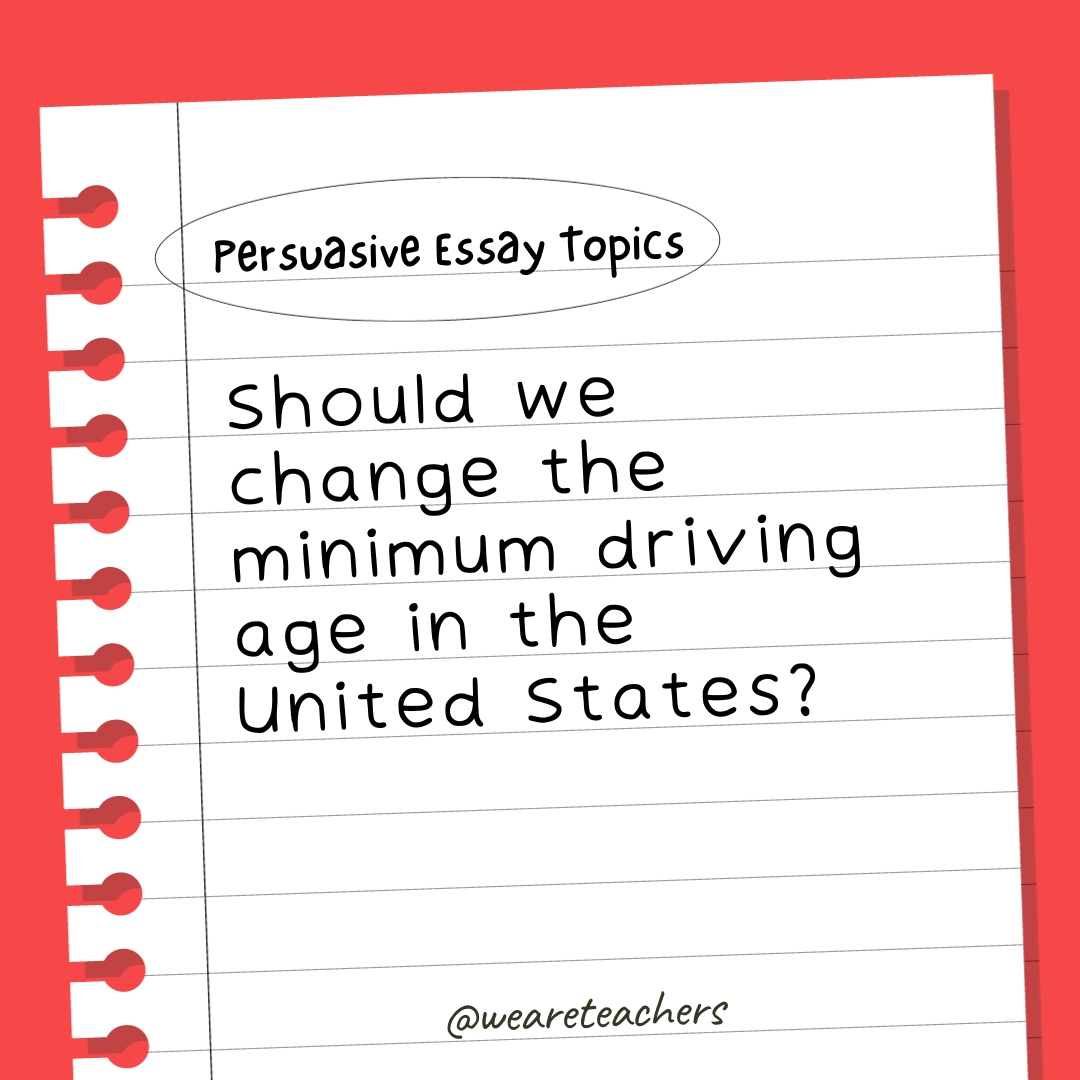
- Which is more important, happiness or success?
- Is democracy the best form of government?
- Is social media helpful or harmful?
- Should parents be punished for their children’s mistakes or crimes?
- Should kids have set bedtimes or just go to bed when they’re sleepy?
- Do you think the government should find a way to provide free health care for everyone?
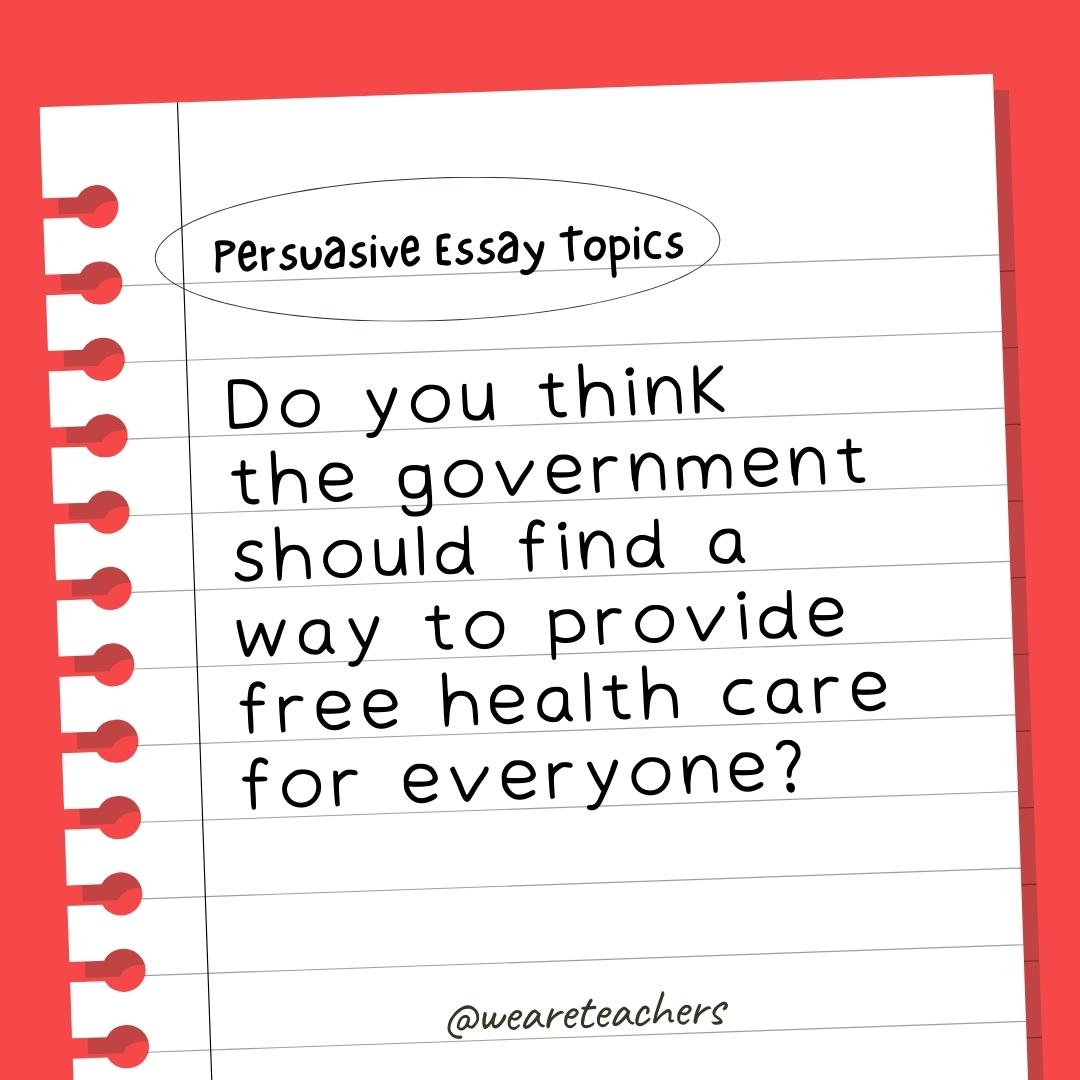
- Is it better to save your allowance or spend it?
- Should we ban plastic bags and bottles?
- Which is better, living in the city or in the country?
- If I could make a new law, it would be …
- Is Pluto a planet?
- Should human cloning be legal?
- Should vaccines be mandatory?
- Is it right for countries to still maintain nuclear weapon arsenals?
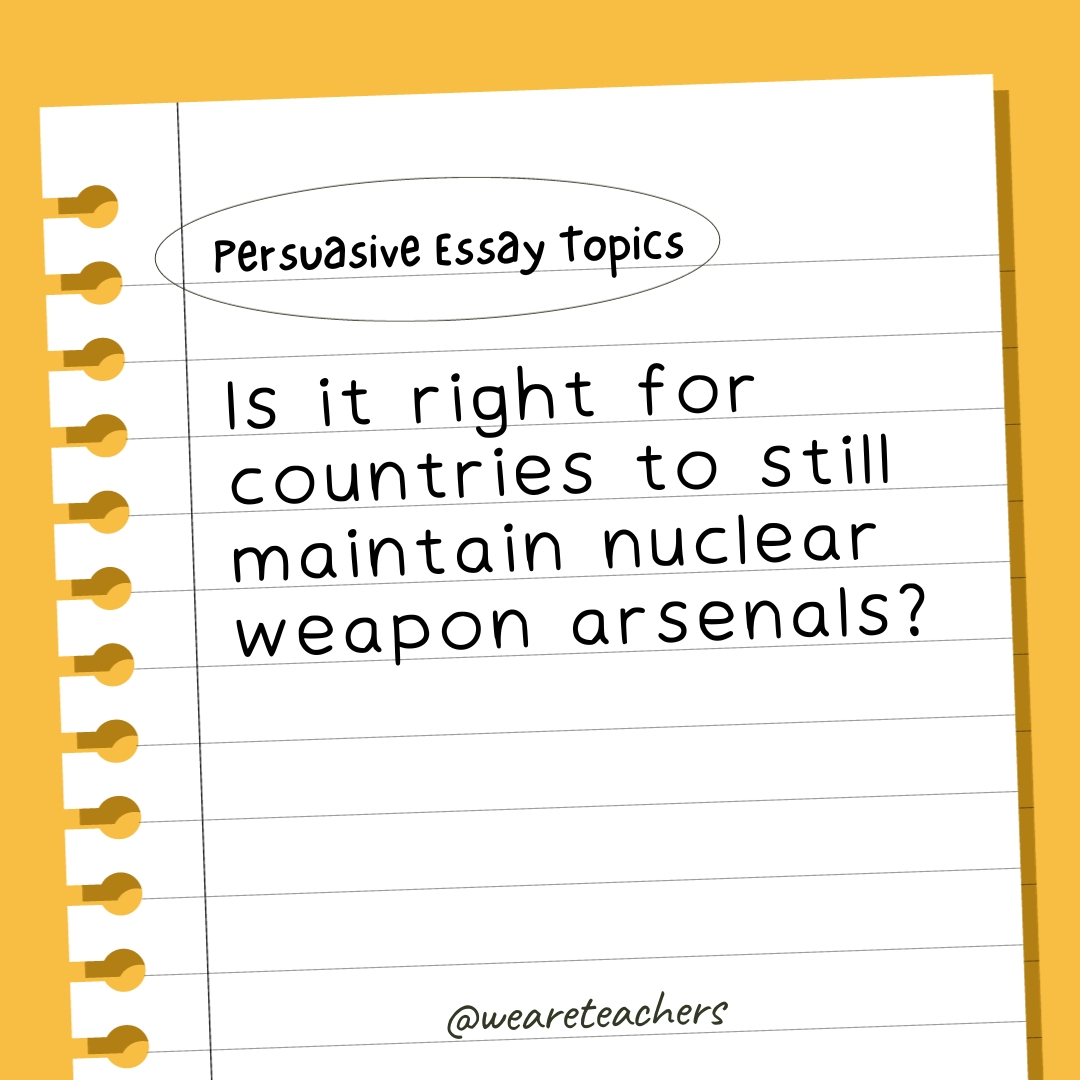
- Should testing on animals be made illegal?
- Will expanded use of artificial intelligence be good for humanity?
- Should all people have free Internet access in their homes?
- Is there intelligent life on other planets?
- Does technology create more jobs than it eliminates?
- Should parents use their children’s cell phones to track where they are?
- Should scientists try to develop a way for people to live forever?
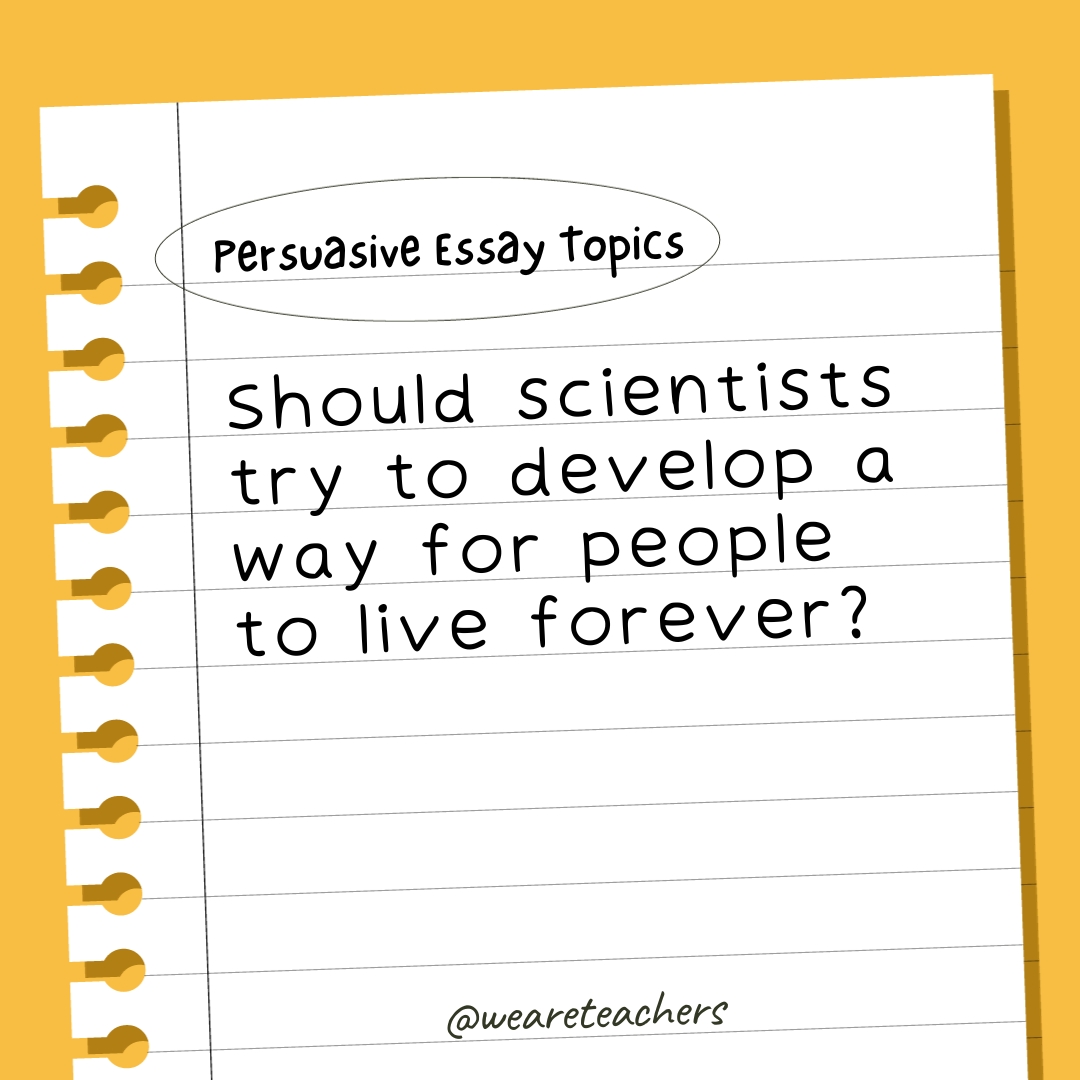
- What’s the best type of smartphone: Android or iPhone?
- Which is better, Macs or PCs?
- Do people rely too much on technology in the modern world?
- Should cryptocurrencies replace cash?
- Should there be a minimum age requirement to own a smartphone?
- Is it important to keep spending money on space exploration, or should we use the money for other things?

- Should kids under 13 be allowed to use social media sites?
- Should we ban cigarette smoking and vaping entirely?
- Is it better to be an animal that lives in the water or on land?
- Should kids be allowed to watch TV on school nights?
- Which is better, paper books or e-books?
- Is the current movie rating system (G, PG, PG-13, etc.) effective?
- Are video games better than board games?
- Should we allow little kids to play competitive sports?
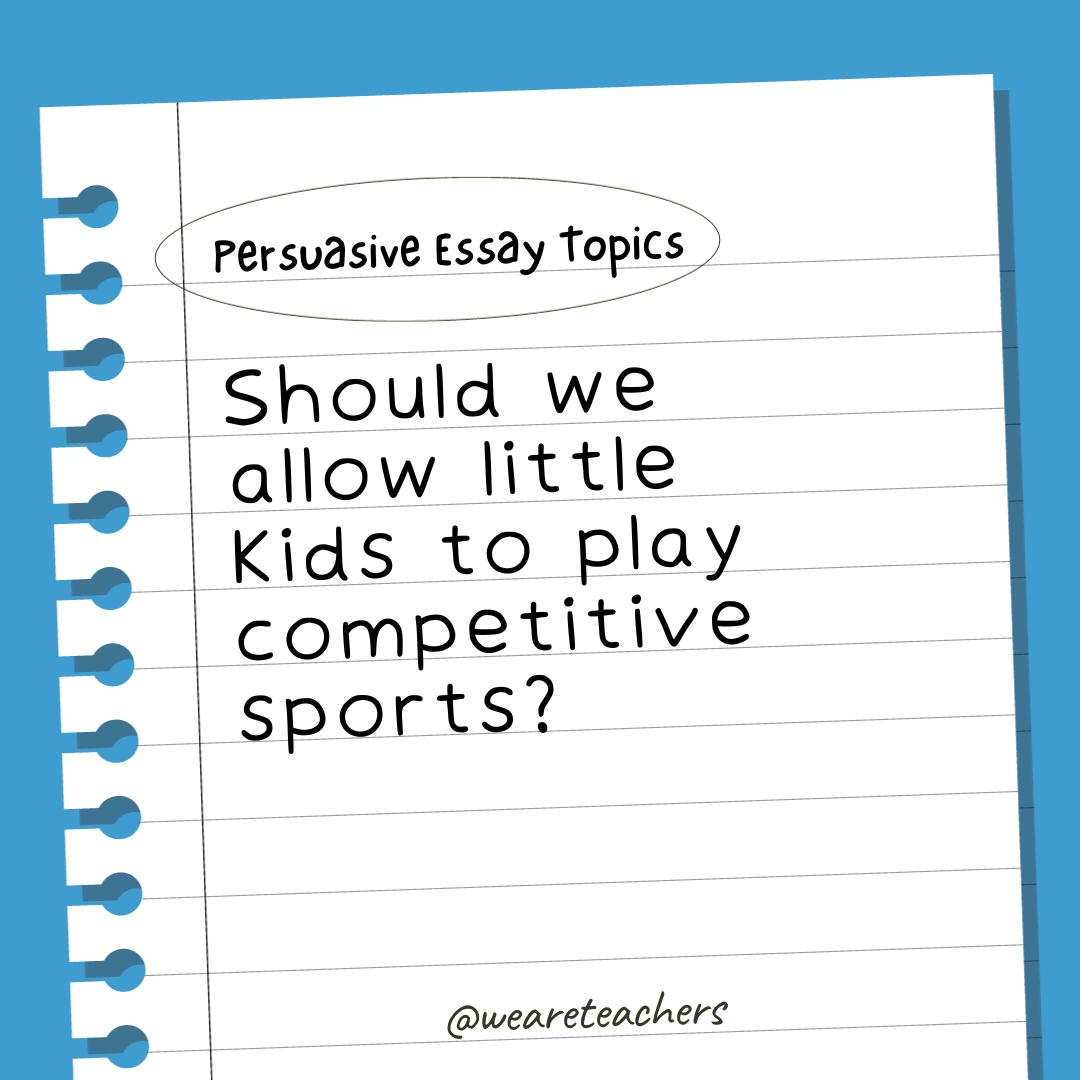
- Which is better, reading books or watching TV?
- Does playing violent video games make people more violent in real life?
- Are graphic novels just as valuable as traditional fictional books?
- Should everyone play on the same sports teams, regardless of gender?
- Choose a book that’s been made into a movie. Which was better, the movie or the book?

- Who is the world’s best athlete, present or past?
- Are professional athletes/musicians/actors overpaid?
- Which is better, fiction or nonfiction?
- The best music genre is …
- What is one book that everyone should read?
- What new sport should be added to the Olympics?
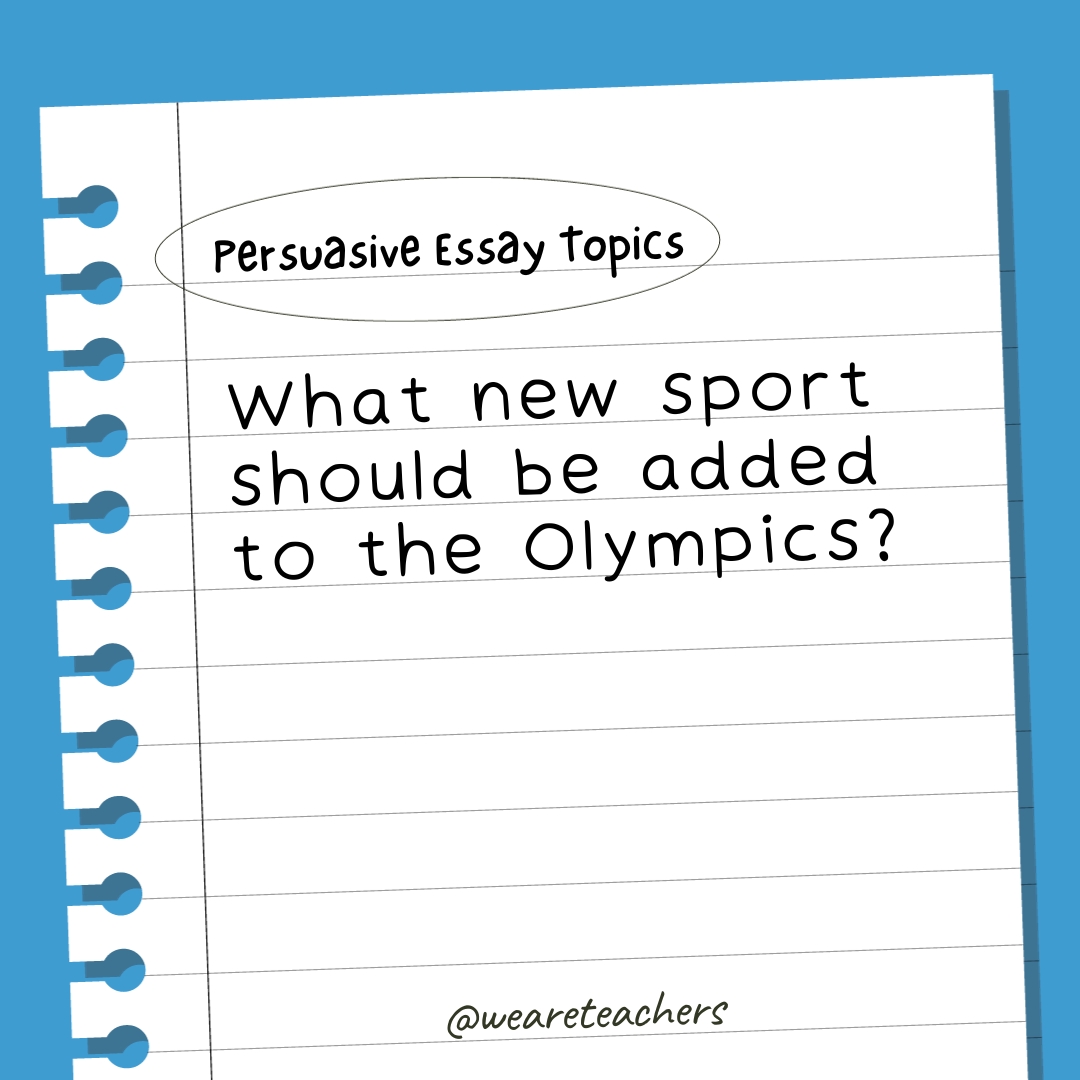
- What’s the best video game system?
- Does playing video games make you smarter?
- Does reality TV actually depict real life?
- Should all neighborhoods have free parks and playgrounds?
- What’s the best holiday?
- The very best food of all time is …
- Which is better, artificial Christmas trees or real ones?
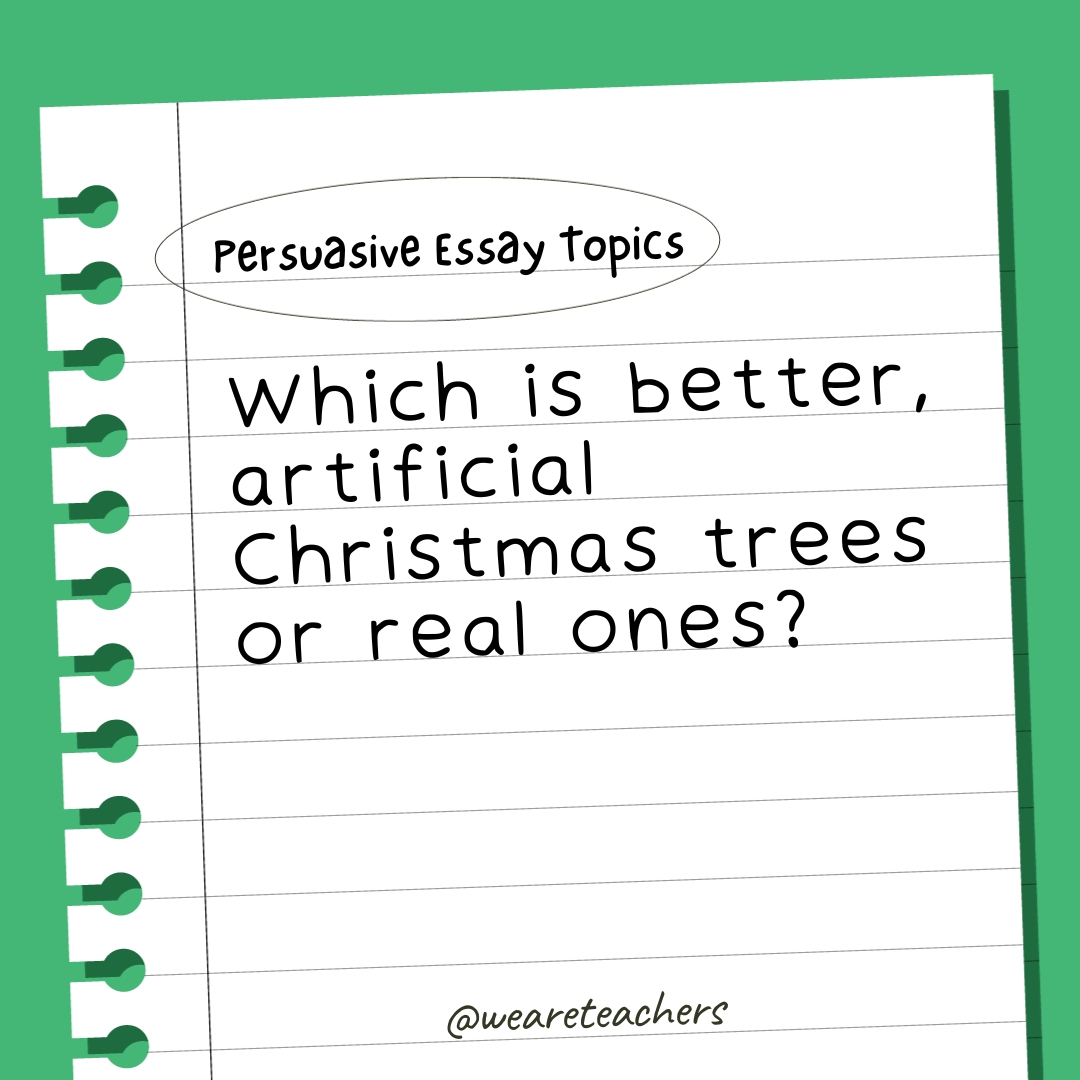
- What’s the best season of the year?
- Should you put ketchup on a hot dog?
- Is a taco a sandwich?
- Does fruit count as dessert?
- Should people have to go to school or work on their birthday?
- Are clowns scary or funny?
- Which is more dangerous, werewolves or vampires?
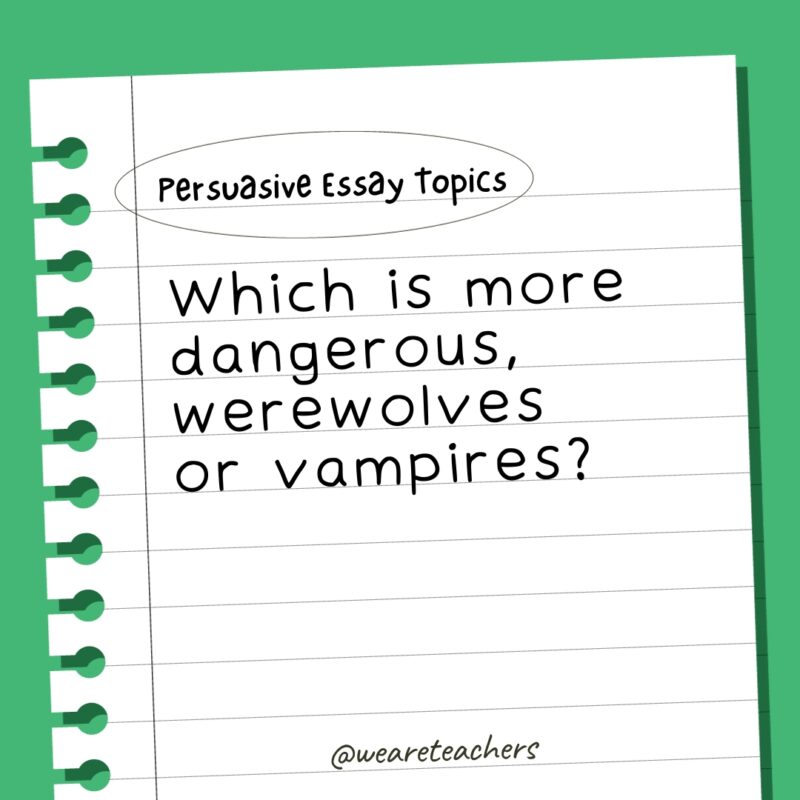
- The best pizza topping is …
- What would be the best superpower to have?
- Should everyone make their bed every day?
- Which came first, the chicken or the egg?
- Should you put pineapple on a pizza?
- Should you eat macaroni and cheese with a spoon or a fork?
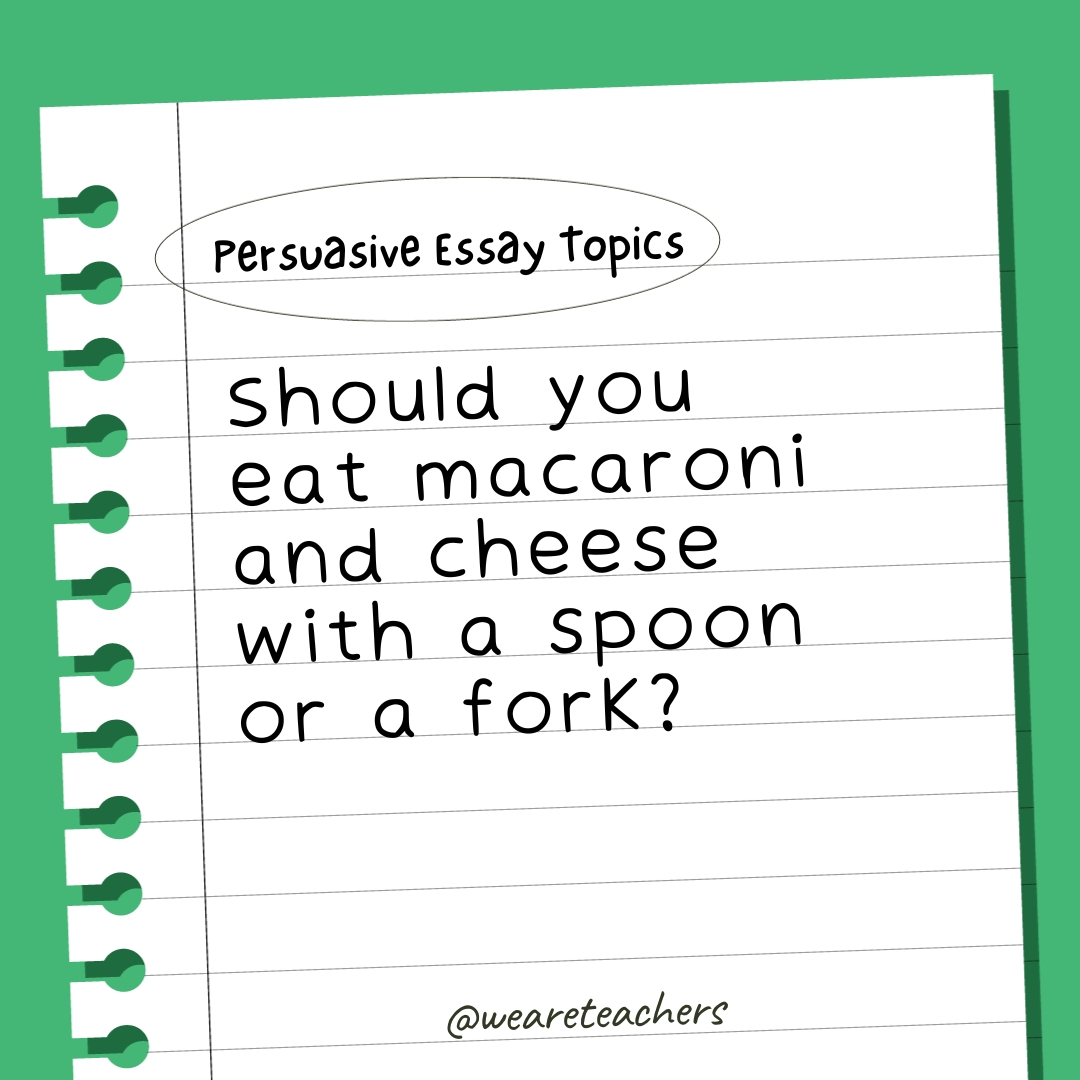
- Describe the world’s best ice cream sundae.
- Is Monday the worst day of the week?
- Would you rather travel back in time or forward in time?
- Is it better to be too hot or too cold?
- Are there aliens living among us here on Earth?
What are your favorite persuasive essay topics for students? Come exchange ideas in the We Are Teachers HELPLINE group on Facebook .
Plus, check out the big list of essay topics for high school (120+ ideas) ..
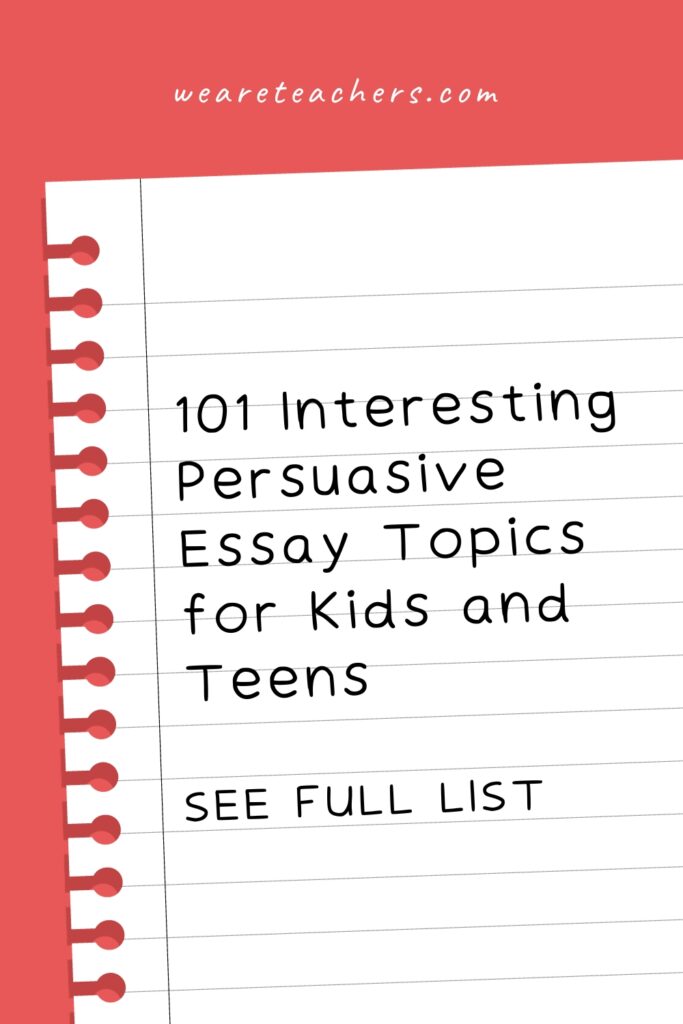
You Might Also Like

The Big List of Essay Topics for High School (120+ Ideas!)
Ideas to inspire every young writer! Continue Reading
Copyright © 2024. All rights reserved. 5335 Gate Parkway, Jacksonville, FL 32256

High School Essay
High school essay generator.
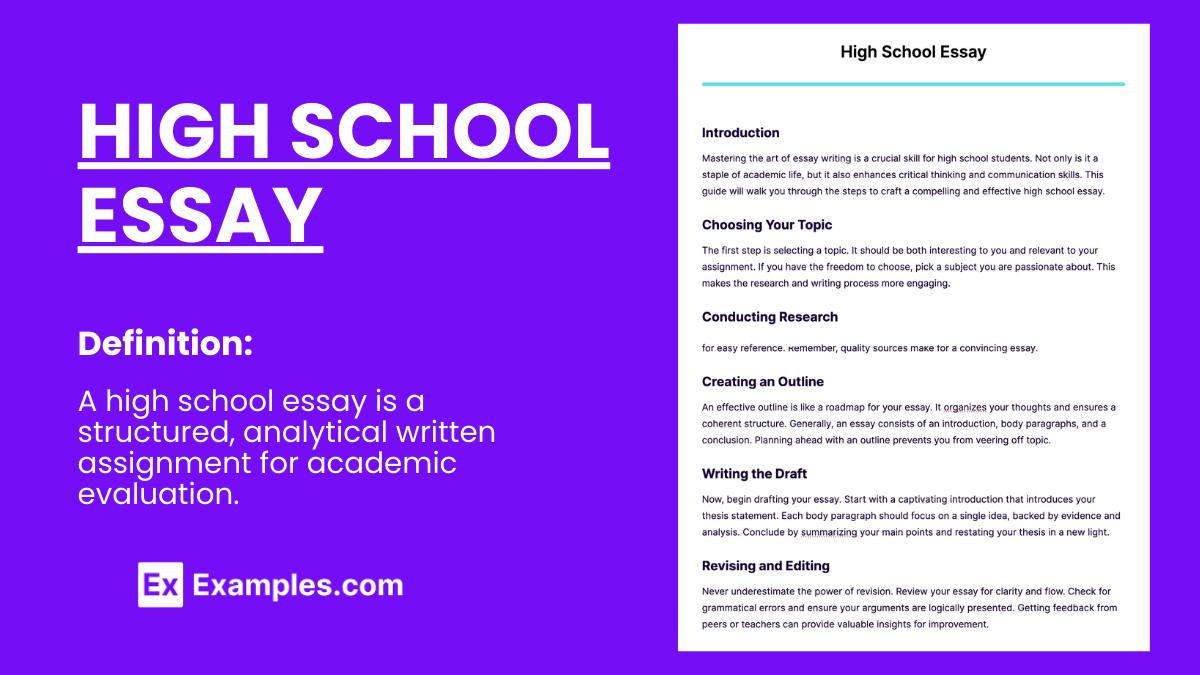
Navigating the complexities of High School Essay writing can be a challenging yet rewarding experience. Our guide, infused with diverse essay examples , is designed to simplify this journey for students. High school essays are a crucial part of academic development, allowing students to express their thoughts, arguments, and creativity. With our examples, students learn to structure their essays effectively, develop strong thesis statements, and convey their ideas with clarity and confidence, paving the way for academic success.
What Is a High School Essay? A high school essay is anything that falls between a literary piece that teachers would ask their students to write. It could be anything like an expository essay , informative essay , or a descriptive essay . High school essay is just a broad term that is used to describe anything that high school student writes, probably in subjects like English Grammar or Literature.
It is a good way to practice every student’s writing skills in writing which they might find useful when they reach college. Others might even be inspired to continue writing and take courses that are related to it.
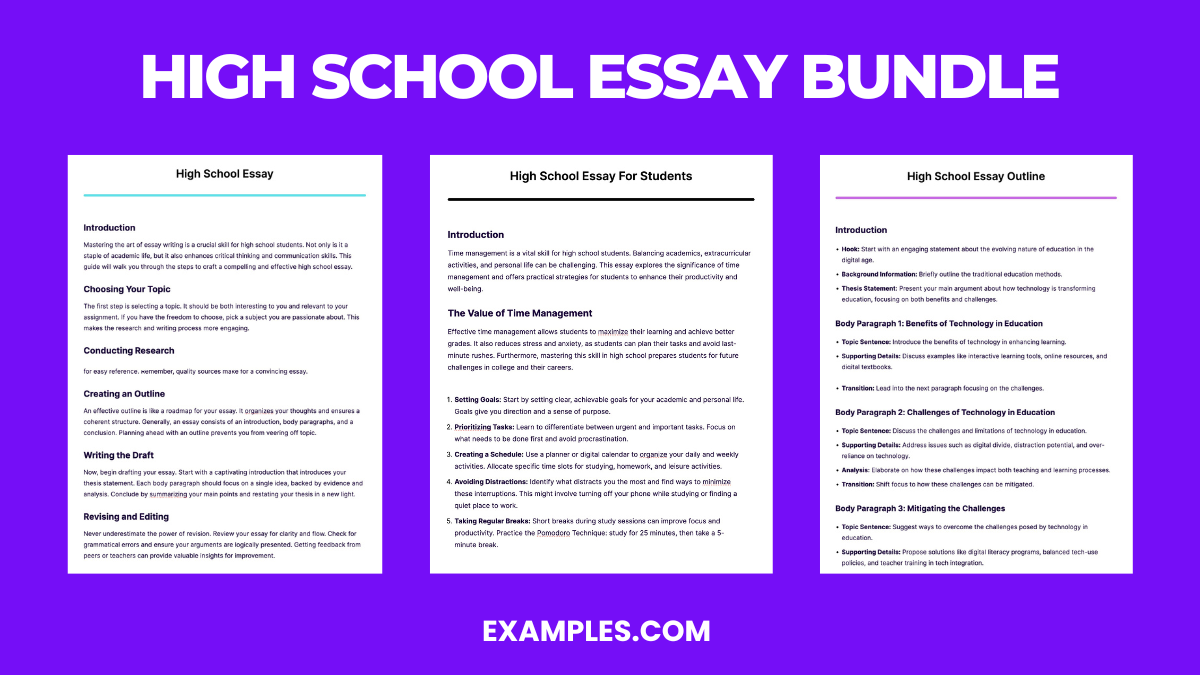
Download High School Essay Bundle
When you are in high school, it is definite that you are expected to do some write-ups and projects which require pen and paper. Yes. You heard that right. Your teachers are going to let you write a lot of things starting from short stories to other things like expository essays. However, do not be intimidated nor fear the things that I have just said. It is but a normal part of being a student to write things. Well, take it from me. As far as I can recall, I may have written about a hundred essays during my entire high school years or maybe more. You may also see what are the parts of an essay?
High School Essay Format
1. introduction.
Hook: Start with an engaging sentence to capture the reader’s interest. This could be a question, a quote, a surprising fact, or a bold statement related to your topic. Background Information: Provide some background information on your topic to help readers understand the context of your essay. Thesis Statement: End the introduction with a clear thesis statement that outlines your main argument or point of view. This statement guides the direction of your entire essay.
2. Body Paragraphs
Topic Sentence: Start each body paragraph with a topic sentence that introduces the main idea of the paragraph, supporting your thesis statement. Supporting Details: Include evidence, examples, facts, and quotes to support the main idea of each paragraph. Make sure to explain how these details relate to your topic sentence and thesis statement. Analysis: Provide your analysis or interpretation of the evidence and how it supports your argument. Be clear and concise in explaining your reasoning. Transition: Use transition words or phrases to smoothly move from one idea to the next, maintaining the flow of your essay.
3. Conclusion
Summary: Begin your conclusion by restating your thesis in a new way, summarizing the main points of your body paragraphs without introducing new information. Final Thoughts: End your essay with a strong closing statement. This could be a reflection on the significance of your argument, a call to action, or a rhetorical question to leave the reader thinking.
Example of High School Essay
Community service plays a pivotal role in fostering empathy, building character, and enhancing societal well-being. It offers a platform for young individuals to contribute positively to society while gaining valuable life experiences. This essay explores the significance of community service and its impact on both individuals and communities. Introduction Community service, an altruistic activity performed for the betterment of society, is a cornerstone for personal growth and societal improvement. It not only addresses societal needs but also cultivates essential virtues in volunteers. Through community service, high school students can develop a sense of responsibility, a commitment to altruism, and an understanding of their role in the community. Personal Development Firstly, community service significantly contributes to personal development. Volunteering helps students acquire new skills, such as teamwork, communication, and problem-solving. For instance, organizing a local food drive can teach students project management skills and the importance of collaboration. Moreover, community service provides insights into one’s passions and career interests, guiding them towards fulfilling future endeavors. Social Impact Secondly, the social impact of community service cannot be overstated. Activities like tutoring underprivileged children or participating in environmental clean-ups address critical societal issues directly. These actions not only bring about immediate positive changes but also inspire a ripple effect, encouraging a culture of volunteerism within the community. The collective effort of volunteers can transform neighborhoods, making them more supportive and resilient against challenges. Building Empathy and Understanding Furthermore, community service is instrumental in building empathy and understanding. Engaging with diverse groups and working towards a common goal fosters a sense of solidarity and compassion among volunteers. For example, spending time at a senior center can bridge the generational gap, enriching the lives of both the elderly and the volunteers. These experiences teach students the value of empathy, enriching their emotional intelligence and social awareness. In conclusion, community service is a vital component of societal development and personal growth. It offers a unique opportunity for students to engage with their communities, learn valuable life skills, and develop empathy. Schools and parents should encourage students to participate in community service, highlighting its benefits not only to the community but also in shaping responsible, caring, and informed citizens. As we look towards building a better future, the role of community service in education cannot be overlooked; it is an investment in our collective well-being and the development of the next generation.
Essay Topics for High School with Samples to Edit & Download
- Should schools have dress codes?
- Sex education in middle school
- Should homework be abolished?
- College education costs
- How does technology affect productivity?
- Is climate change reversible?
- Is social media helpful or harmful?
- Climate change is caused by humans
- Effects of social media on youth
- Are men and women treated equally?
- Are professional athletes overpaid?
- Changes over the past decade
- Guns should be more strictly regulated
- My favorite childhood memory
- Religion in school
- Should we stop giving final exams?
- Video game addiction
- Violence in media content
High School Essay Examples & Templates
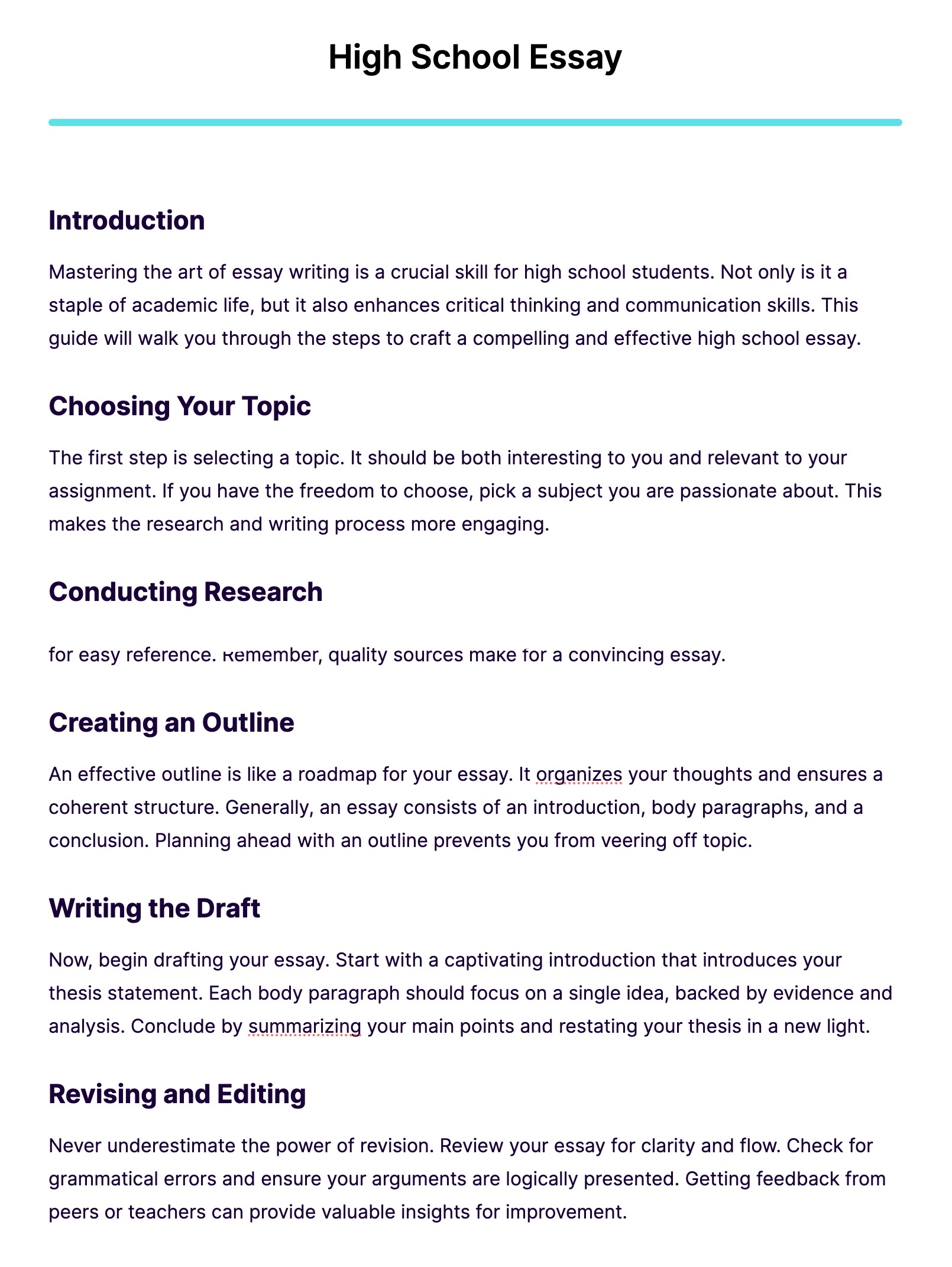
Free Download
High School Essay For Students
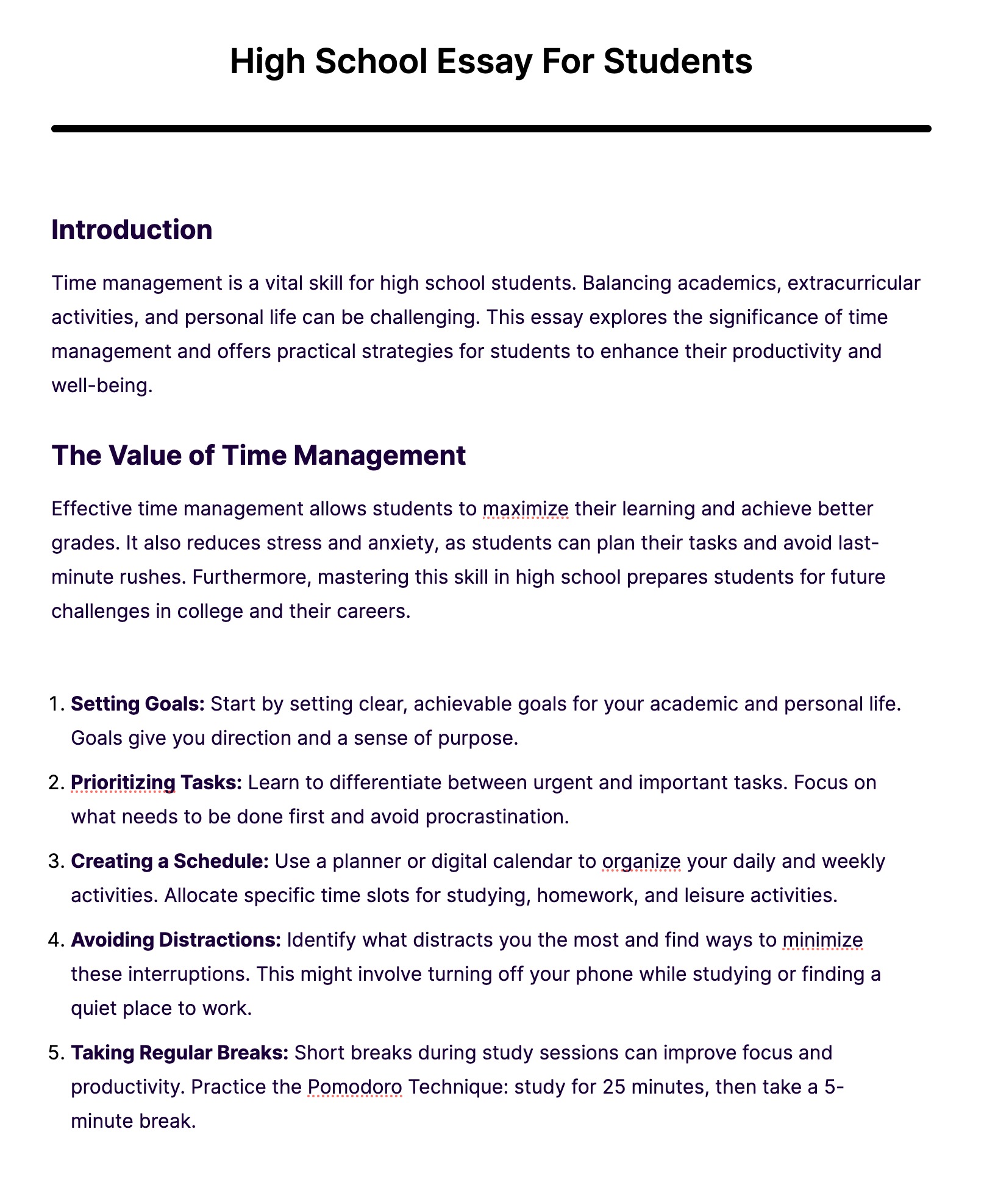
High School Essay Outline
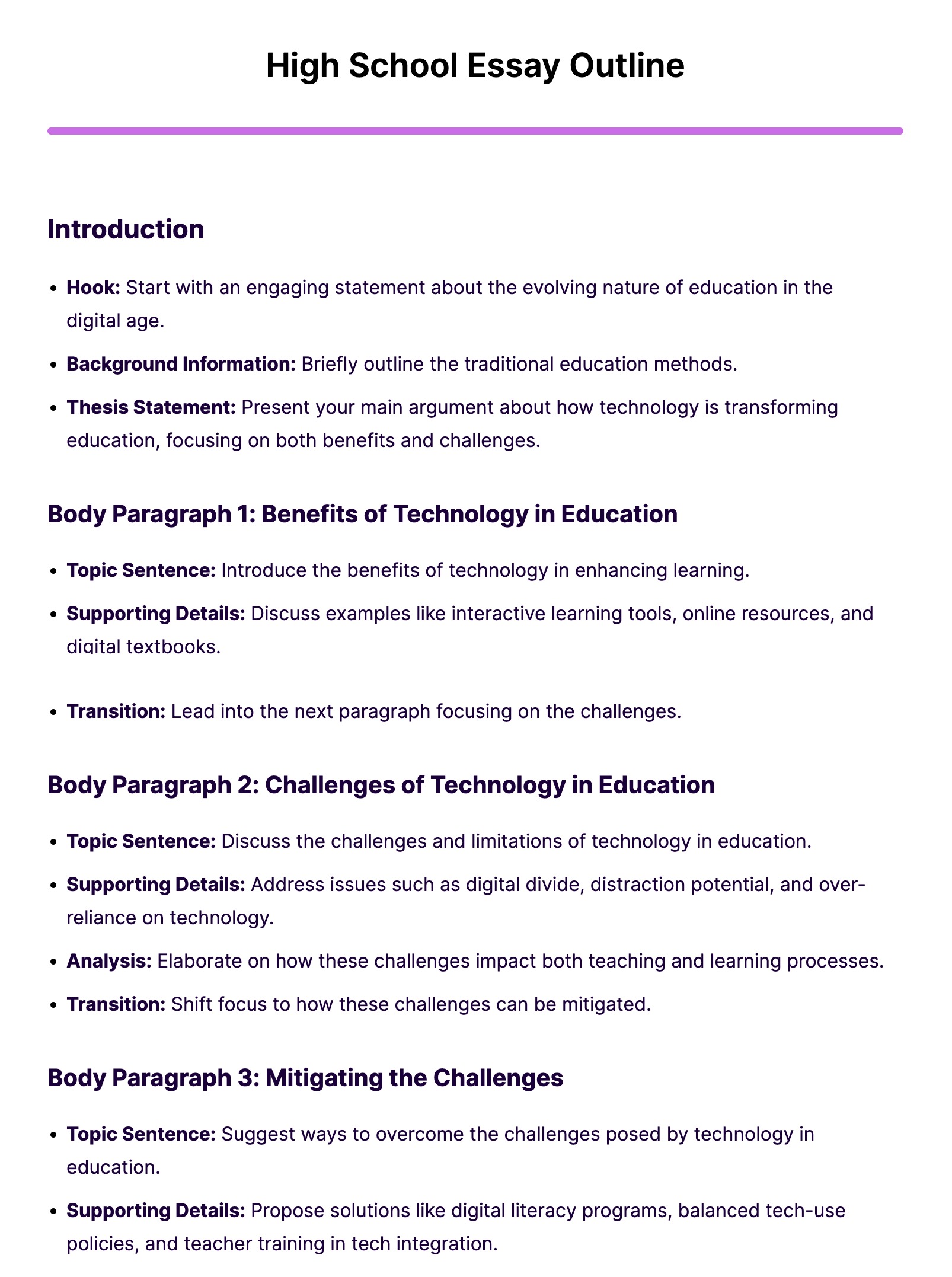
High School Essay Example
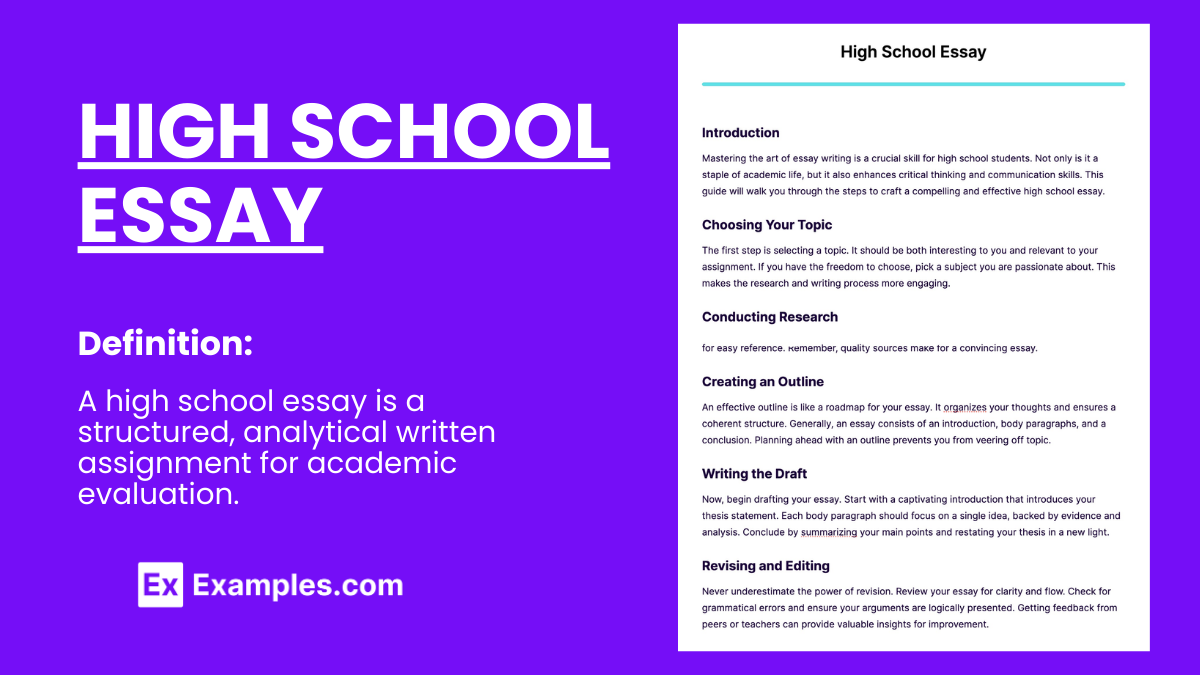
High School Self Introduction Essay Template
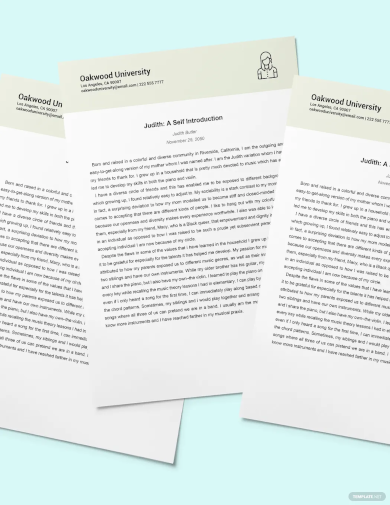
High School Student Essay

englishdaily626.com
Reflective High School
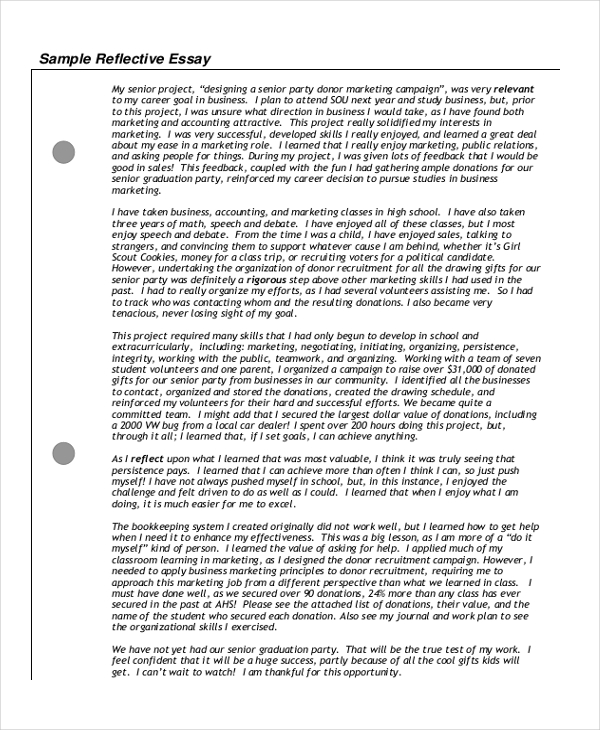
oregoncis.uoregon.edu
Argumentative Essays for High School
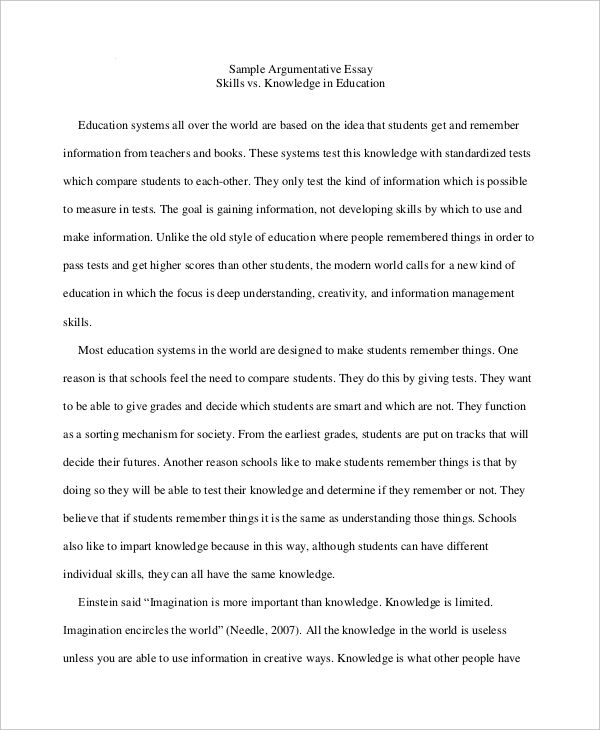
Informative Essays for High School
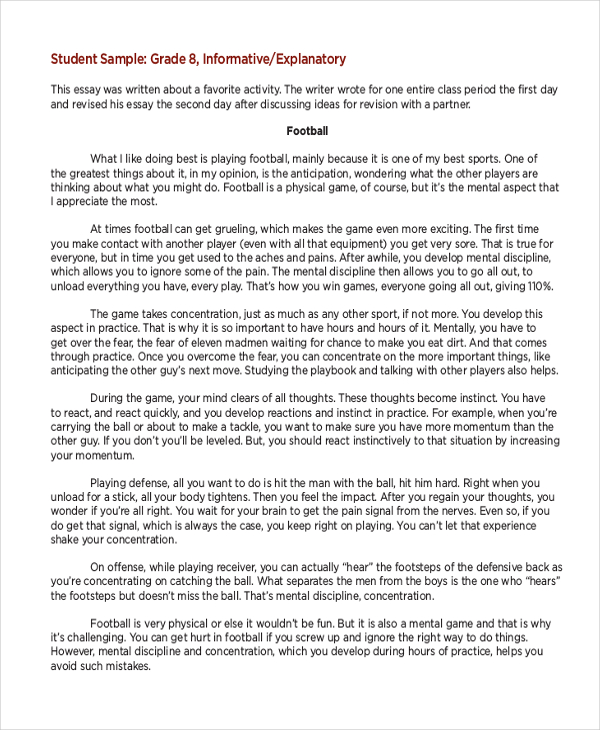
High School Persuasive
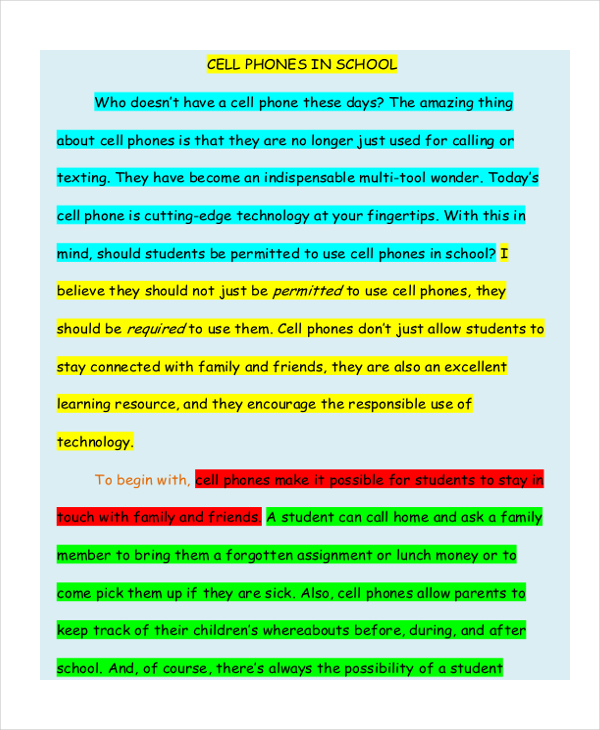
writecook.com
Narrative Essays
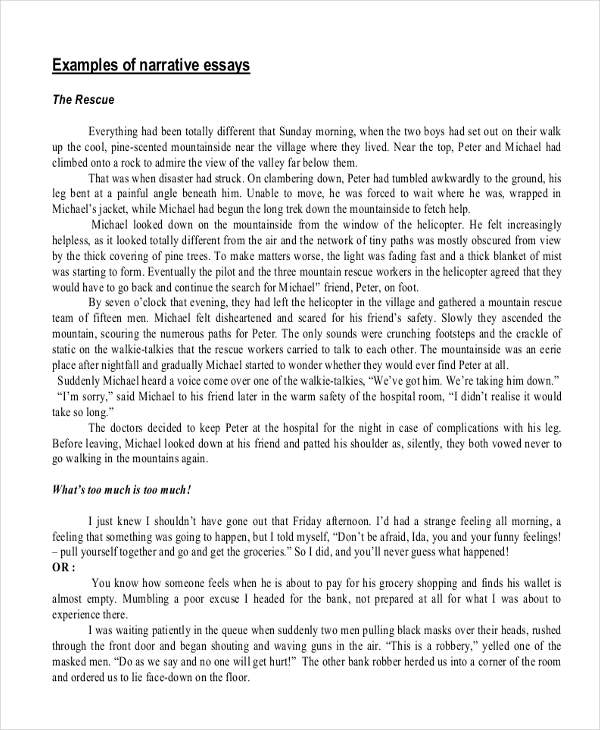
Scholarship Essays

High School Application
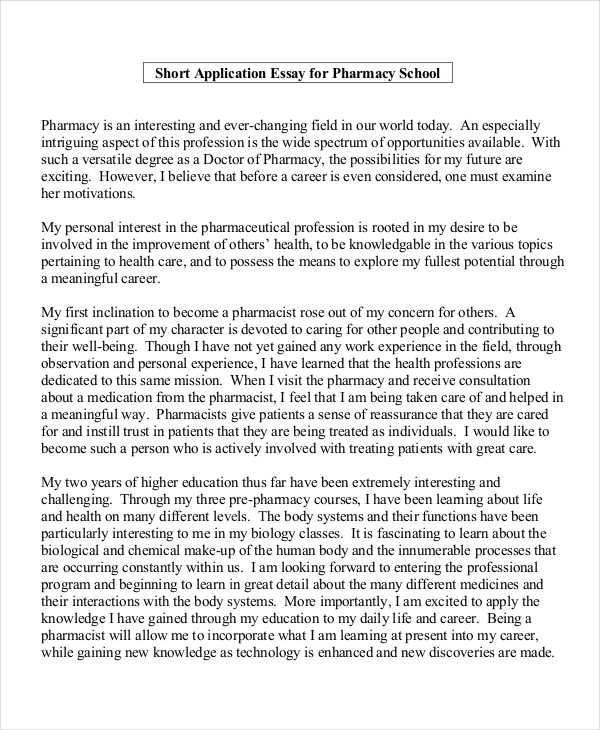
e-education.psu.edu
High School Graduation Essay
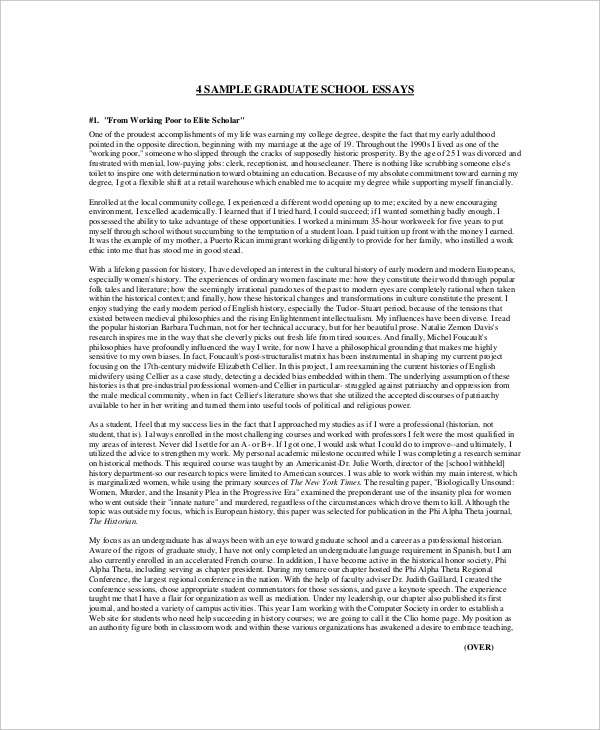
High School Leadership Essay
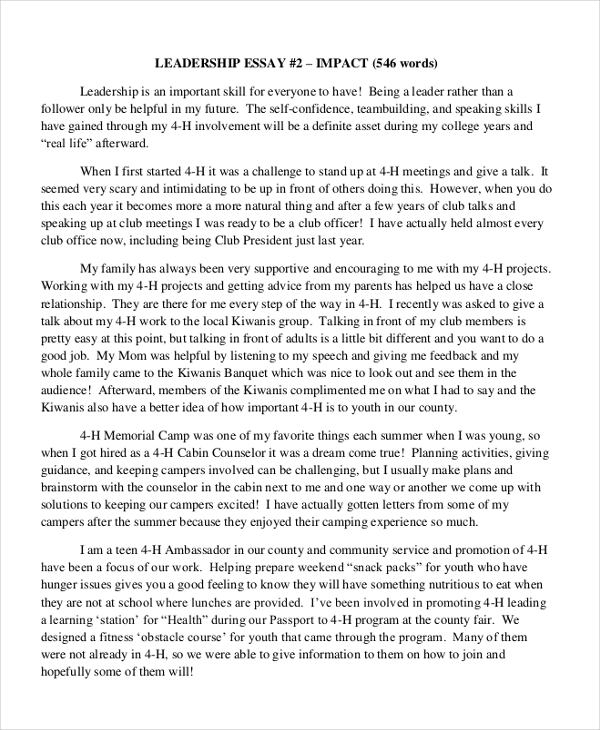
web.extension.illinois.edu
How to Write a High School Essay
Some teachers are really not that strict when it comes to writing essay because they too understand the struggles of writing stuff like these. However, you need to know the basics when it comes to writing a high school essay.
1. Understand the Essay Prompt
- Carefully read the essay prompt or question to understand what’s required. Identify the type of essay (narrative, persuasive, expository, etc.) and the main topic you need to address.
2. Choose a Topic
- If the topic isn’t provided, pick one that interests you and fits the essay’s requirements. Make sure it’s neither too broad nor too narrow.
3. Conduct Research (if necessary)
- For expository, argumentative, or research essays, gather information from credible sources to support your arguments. Take notes and organize your findings.
4. Create an Outline
- Outline your essay to organize your thoughts and structure your arguments effectively. Include an introduction, body paragraphs, and a conclusion.
5. Write the Introduction
- Start with a hook to grab the reader’s attention (a quote, a question, a shocking fact, etc.). Introduce your topic and end the introduction with a thesis statement that presents your main argument or purpose.
6. Develop Body Paragraphs
- Each body paragraph should focus on a single idea or argument that supports your thesis. Start with a topic sentence, provide evidence or examples, and explain how it relates to your thesis.
7. Write the Conclusion
- Summarize the main points of your essay and restate your thesis in a new way. Conclude with a strong statement that leaves a lasting impression on the reader.
Types of High School Essay
1. narrative essay.
Narrative essays tell a story from the writer’s perspective, often highlighting a personal experience or event. The focus is on storytelling, including characters, a setting, and a plot, to engage readers emotionally. This type allows students to explore creativity and expressiveness in their writing.
2. Descriptive Essay
Descriptive essays focus on detailing and describing a person, place, object, or event. The aim is to paint a vivid picture in the reader’s mind using sensory details. These essays test the writer’s ability to use language creatively to evoke emotions and bring a scene to life.
3. Expository Essay
Expository essays aim to explain or inform the reader about a topic in a clear, concise manner. This type of essay requires thorough research and focuses on factual information. It’s divided into several types, such as compare and contrast, cause and effect, and process essays, each serving a specific purpose.
4. Persuasive Essay
Persuasive essays aim to convince the reader of a particular viewpoint or argument. The writer must use logic, reasoning, and evidence to support their position while addressing counterarguments. This type tests the writer’s ability to persuade and argue effectively.
5. Analytical Essay
Analytical essays require the writer to break down and analyze an element, such as a piece of literature, a movie, or a historical event. The goal is to interpret and make sense of the subject, discussing its significance and how it achieves its purpose.
6. Reflective Essay
Reflective essays are personal pieces that ask the writer to reflect on their experiences, thoughts, or feelings regarding a specific topic or experience. It encourages introspection and personal growth by examining one’s responses and learning from them.
7. Argumentative Essay
Similar to persuasive essays, argumentative essays require the writer to take a stance on an issue and argue for their position with evidence. However, argumentative essays place a stronger emphasis on evidence and logic rather than emotional persuasion.
8. Research Paper
Though often longer than a typical essay, research papers in high school require students to conduct in-depth study on a specific topic, using various sources to gather information. The focus is on presenting findings and analysis in a structured format.
Tips for High School Essays
Writing a high school essay if you have the tips on how to do essay effectively . This will give you an edge from your classmates.
- Stay Organized: Keep your notes and sources well-organized to make the writing process smoother.
- Be Clear and Concise: Avoid overly complex sentences or vocabulary that might confuse the reader.
- Use Transitions: Ensure that your paragraphs and ideas flow logically by using transition words and phrases.
- Cite Sources: If you use direct quotes or specific ideas from your research, make sure to cite your sources properly to avoid plagiarism.
- Practice: Like any skill, essay writing improves with practice. Don’t hesitate to write drafts and experiment with different writing styles.
Importance of High School Essay
Aside from the fact that you will get reprimanded for not doing your task, there are more substantial reasons why a high school essay is important. First, you get trained at a very young age. Writing is not just for those who are studying nor for your teachers. As you graduate from high school and then enter college (can see college essays ), you will have more things to write like dissertations and theses.
At least, when you get to that stage, you already know how to write. Aside from that, writing high essays give a life lesson. That is, patience and resourcefulness. You need to find the right resources for your essay as well as patience when finding the right inspiration to write.
How long is a high school essay?
A high school essay typically ranges from 500 to 2000 words, depending on the assignment’s requirements and the subject matter.
How do you start a personal essay for high school?
Begin with an engaging hook (an anecdote, quote, or question) that introduces your theme or story, leading naturally to your thesis or main point.
What makes a good high school essay?
A good high school essay features a clear thesis, coherent structure, compelling evidence, and personal insights, all presented in a polished, grammatically correct format.
Text prompt
- Instructive
- Professional
Write a High School Essay on the importance of participating in sports.
Discuss the role of student government in high schools in a High School Essay.

23 Persuasive writing Topics for High School students
Persuasive Writing Topics for High School Students
Writing a persuasive essay can be difficult for teachers and students if you don’t have a great idea to help get those creative juices flowing. These prompts cover a range of issues and topics that are pertinent to middle school and high school students and can be easily adapted to work with a topic you have been teaching in your own class.
Students really enjoy the opportunity to try and change the world in which they live, and hopefully, these prompts might be a great starting point.
Remember that if you are looking for more excellent free resources and structured guides to teach all aspects of English, especially writing, be sure to visit literacyideas.com and check out our vast collection of prompts here.
Year Long Inference Based Writing Activities

Tap into the power of imagery in your classroom to master INFERENCE as AUTHORS and CRITICAL THINKERS .
⭐⭐⭐⭐⭐ (26 Reviews)
This YEAR-LONG 500+ PAGE unit is packed with robust opportunities for your students to develop the critical skill of inference through fun imagery, powerful thinking tools, and graphic organizers.
TOP PERSUASIVE WRITING TOPICS
- Some parents give children a weekly or monthly allowance regardless of their behavior because they believe an allowance teaches children to be financially responsible. Other parents only give children an allowance as a reward for completing chores or when they have behaved properly. Explain what you think parents should do and why.
- Many schools now require teenagers to spend a certain number of hours each term doing volunteer work or community service. Some people believe this is an excellent idea as it promotes good citizenship and cultivates compassion. Others feel that forced volunteerism is not volunteering at all. How do you feel about this issue? Use specific reasons and examples to support your position.
- Some parts of the world allow people to get a driver’s license at age sixteen. Many feel this age is much too young for the responsibility that comes with driving a car and that teenagers should not be allowed to drive until the age of 18. In your opinion, at what age should people be allowed to drive, and why?
- What is your all-time favorite book or movie and why? Write an essay persuading readers to watch this film or read this book.
- Have you ever made a life changing action that has had a positive effect on you or the lives of others? Write an essay that convinces readers to make a change for the better.
- You have been asked to write a letter that would convince a organizers of a major event to be hosted in your hometown. Write an essay that convinces these delegates that your town would be great host.
- Top professional athletes often have salaries and bonuses in the tens of millions of dollars. Do you think these athletes deserve this type of income? Why or why not? Explain your position and use specific reasons and examples.
- Humans have always wondered about the possibility of life on other planets in the universe. Do you believe extraterrestrial life exists? Write an essay persuading others to share your point of view .
- If someone discovered the ‘Elixir of life’ that would enable us to live forever, would it be a blessing or a curse? Use specific reasons and examples to support your answer.
- If you have you ever traveled to a place that you found very meaningful and rewarding? Write an essay that persuades others to visit this important place.
- Nearly all private schools require students to wear uniforms. Should public school students wear uniforms too? Argue for or against school uniforms for public school students. Use specific reasons and examples to support your position.
- You are to select one item from the twenty-first century to place in a time capsule for future generations, what would you choose? Use specific reasons and examples to support your choice, explaining both the item’s significance and the reasons why it embodies the culture of the early twenty-first century.
- What would improve your town or city? Write an essay convincing officials to make a change that would improve your neighborhood.
- Some studies have shown students often perform better on exams if music is played softly in the background. However, some students may find the music distracting. Should schools play classical music during exams and/or allow students to listen to headphones whilst working? Take a position and explain your answer.
- Should parents be a child’s disciplinarian, or their best friend?
- Take a position and explain your answer using specific reasons and examples.
- Millions of people visit zoos around the world. But some people believe that zoos are inhumane and that animals should not be kept in captivity. Do you agree? Why or why not? Use specific reasons and examples to support your position.
- In most countries people pay taxes based upon how much they earn: the higher their income, the higher the percentage of that income they must pay in taxes. Many people argue that a flat tax, in which everyone pays the same rate regardless of income, would be a more equitable and desirable tax system. Which of these two tax systems do you think is best, and why? Use specific reasons and examples to support your answer.
- Is it wise to devote time and money to building a space station on the moon or Mars? Why or why not? Explain your answer.
- An ancient Greek proverb states, “All things good to know are difficult to learn.” Do you agree? Why or why not? Use specific reasons and examples to explain your answer.
- Imagine that you know someone who is unfamiliar with computers and has never been on the Internet. Write an essay convincing this relative to get a computer and get online.
- Imagine that you have made it to the final round of interviews for your dream job. Convince your prospective employers that you are the one who most deserves the position.
- Is there something that you believe is truly worth fighting for? Write an essay persuading others that this cause is worth a fight.
If you have any other great ideas for persuasive prompts please post them in the comments section below.
A COMPLETE TEACHING UNIT ON PERSUASIVE WRITING SKILLS
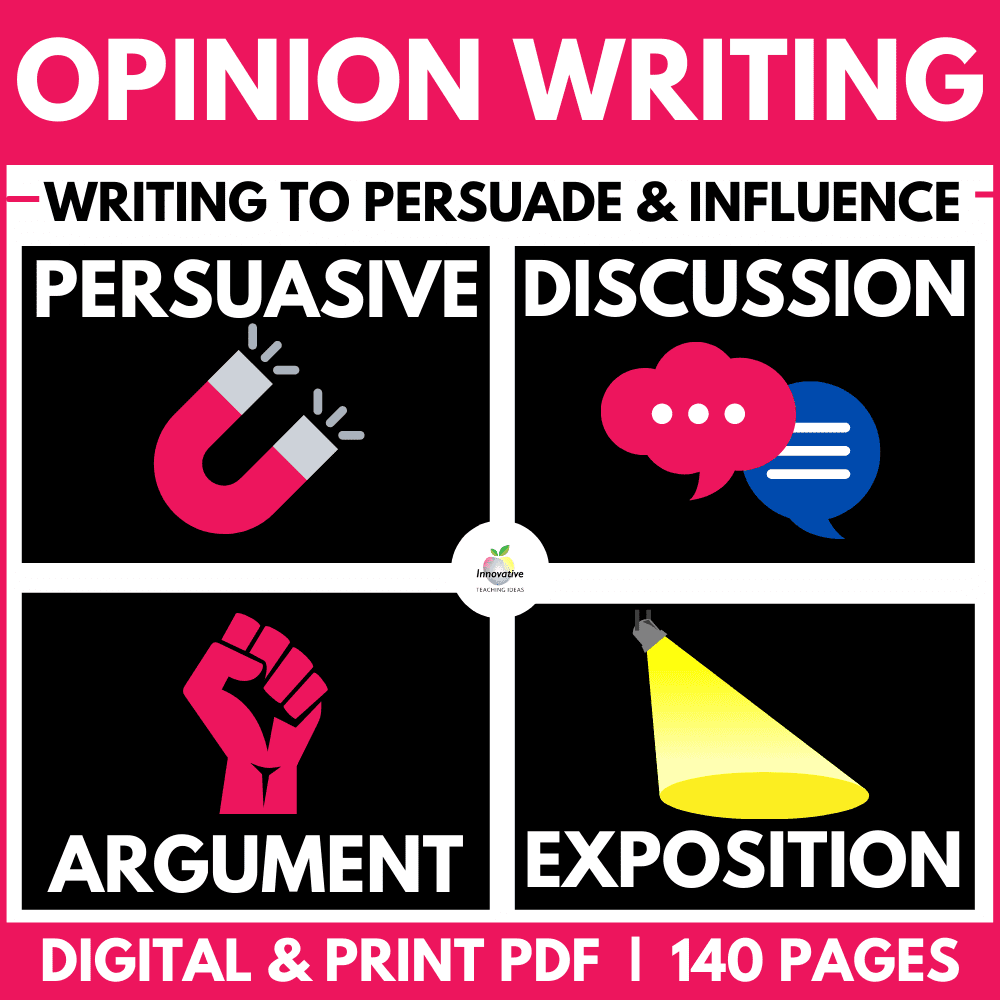
Teach your students to produce writing that PERSUADES and INFLUENCES thinking with this HUGE writing guide bundle covering: ⭐ Persuasive Texts / Essays ⭐ Expository Essays⭐ Argumentative Essays⭐ Discussions.
A complete 140 PAGE unit of work on persuasive texts for teachers and students. No preparation is required.
Home — Essay Samples — Education — Educational System — High School
Essays on High School
The similarities between high school and college, reflections on my high school experience, made-to-order essay as fast as you need it.
Each essay is customized to cater to your unique preferences
+ experts online
What High School Taught Me
About struggling in school: my expirience, the importance of higher education in our life, about my first day at high school, let us write you an essay from scratch.
- 450+ experts on 30 subjects ready to help
- Custom essay delivered in as few as 3 hours
Exploring Student Perspectives on Education
Importance of internet for today’s high school and college classes, my high school graduation speech, high school graduates should take a year off before entering college – student gap years, get a personalized essay in under 3 hours.
Expert-written essays crafted with your exact needs in mind
An Excursion to High School
Procrastination self efficacy and exam anxiety among high school students, the problem of students’ dropping out of high school to take a job, financial stress and its impact of grade 11 senior high school students, high school education review, a quest for excellence by arcadia high school, the beginning of my nightmare: first day of high school, fools are found in schools, structure of the graduate record examination, the feeling of being outcast, why should school start later: negative effects of early school start, the effects of too much homework on children, arguments about why school uniforms should be required, do schools do enough to prevent bullying, transition from high school to university: literature review, the result of the road not taken, an argument in favor of moving the start time for high school students, career planning for high school or college student, review of the film the breakfast club, cosmetology programs in high schools.
A high school is a secondary school, where teenagers are educated before starting college or getting jobs. Most high schools have four numbered grades, from ninth to twelfth.
Relevant topics
- Middle School
- Importance of Education
- College Experience
- Academic Challenges
- Studying Abroad
- School Uniform
- Academic Interests
- Physical Education
- Stem Education
By clicking “Check Writers’ Offers”, you agree to our terms of service and privacy policy . We’ll occasionally send you promo and account related email
No need to pay just yet!
Bibliography
We use cookies to personalyze your web-site experience. By continuing we’ll assume you board with our cookie policy .
- Instructions Followed To The Letter
- Deadlines Met At Every Stage
- Unique And Plagiarism Free
- Dissertation
- PowerPoint Presentation
- Book Report/Review
- Research Proposal
- Math Problems
- Proofreading
- Movie Review
- Cover Letter Writing
- Personal Statement
- Nursing Paper
- Argumentative Essay
- Research Paper
- Discussion Board Post
Sociology Research Topics Making Projects Professional

Table of Contents
Are you enthusiastic about investigating sociological issues and phenomena but every time you are assigned to such an assignment you cannot decide on appropriate sociology topics to research? The list of diverse sociology research topics can address the problem of a constant lack of creative ideas. Boost your inspiration!
Sociological Research Strategies
The choice of sociology research topics proves puzzling since it has a few intricacies you should prioritize. Primarily, it is your passion for a selected subject. Another aspect is your competence. It implies that the chosen sociology research paper topics should meet your academic goals.
The last nuance, which is critical, but learners routinely omit, is a sociological strategy required for investigating selected sociology research topics. Competent top-rated coursework writing service authors distinguish a few major sociological methods that can be employed for revealing sociology research topics thoroughly.
- Information analysis.
While most inexperienced authors use this method as only one in their studies, it is one of the numerous strategies you can take to deep dive into sociology research paper topics.
- Case studies.
Investigating particular cases independently or gleaning ideas from earlier prepared studies is always a viable option.
Concluding on an in-depth representative sample is more sensible than gathering merely theoretical data without practical evidence.
- Interviews.
Savvy specialists are familiar with insights into research topics for sociology and share their expertise in such conversations.
When you have structured details about sociological research methods and are aware of how to employ them in practice, your chances of conveying the main message and revealing sociology topics decently are doubled. Authors familiar with basic methodological techniques no longer face a lack of creative ideas and data while completing research projects.
Interesting Sociology Research Topics
Sociology topics to research comprise questions related to the interaction between diverse cultures, social institutions and their place in people’s socialization, personal identity determination, educational systems and their effect on the economic development of the states, political systems, place of technology in social classes stratification, behavior patterns, and many other sociology research topics you can investigate in your sociology research paper .
Sociology research topics are routinely categorized by aspects they cover within sociology as a science. However, ten interesting sociology research topics on various sociological niches are gathered below to highlight the most pressing issues in the field. Look through the sociology research topics list and glean ideas for custom titles.
- Problems of social mobility and migration processes in the world.
- Sociological interpretation of social self-organization.
- Social stratification measurement criteria.
- Social status: Psychological pressure and biases.
- National mentality influences a country’s brand.
- Traditions and laws are regulators of human behavior.
- Interaction of social and personal values.
- Specificity of social conflicts between individuals of different social statuses.
- Social innovation: Breakthrough in self-acceptance and personal awareness.
- Social process management: Major stakeholders.
Easy sociology research topics
If it is your primary experience of investigating sociology research topics, what about clear-cut but interesting sociology research topics? The straightforward titles do not imply worse results but guarantee sufficient theoretical and empirical information on such subjects. Check a few simple sociology research topics below.
- The social knowledge structure.
- The role of sociology in modern society formation.
- Empirical sociology in the structure of social knowledge.
- Staging of the formation and development of sociology as an independent science.
- Positive and negative aspects of marginalization.
- Social structure transformation trends.
- Socialization’s role in the person’s awareness of their identity.
- Decision management specifics in interpersonal relationships.
- Models of economic behavior in countries with a high development level.
- Effective methods for fostering employee motivation.
Sociology research topics for high school students
Finding good sociology research topics is not as challenging as opting for ideas that meet the project instructions. If your task description gives you freedom of choice, you can look through the following sociology research topics list and opt for a perfect match to your interests.
- Peer pressure influences decision-making.
- Teens’ sociological data processing methodology.
- Factors of young people’s opinion formation.
- Teen’s social adaptation after emigration.
- Symbols of national culture.
- Social space interpretation’s effect on youth’s worldviews.
- Social efficiency of law in less developed countries.
- Manifestations of social maturity in practice.
- Ageism is an obstacle to adaptation in the workplace.
- Social capital in economic relations.
Sociology research topics on mental health
Anxiety, mental disorders, lack of sleep, and energy are critical social issues of the current technological generation. If you opt for such sociology research topics and dive deeper into their investigation, chances of completing a project at a decent score are high. Become familiar with good topics for sociology research paper relevant to a huge audience.
- Impact of social inequalities on mental health.
- Background anxiety is a consequence of excess dopamine.
- Practices of spreading awareness of the healthy sleep cruciality.
- Can health have a valuable dimension in modern society?
- Mainstreaming the mental disorders issue among young people at the state level.
- Impact of mental health care institutes’ policies on citizens’ decision-making patterns.
- Dependence of the population’s psychological development level on the state’s social development.
- Stress resistance is the basis of professional health.
- Mental health is an economic and social good.
- The practice of including mental health services in work insurance plans.
Sociology research topics on family
The gap between young people’s and adults’ perceptions of family is growing so the research focus shifts to innovative sociology marriage and family research topics. As sociology is a multifaceted field, the variety of family sociology topics is immense.
- Family roles: Individual’s self-determination.
- Intergenerational ties and gaps in worldview.
- Key causes of marriage breakdown: Psychological incompatibilities of partners.
- Proven practices of building mutual understanding on issues of raising children as a couple.
- Globalizing systems of marital relations.
- Psychological trauma at an early age affects the future success of an individual.
- The family’s function of emotional satisfaction.
- Living conditions and psycho-emotional state and their relationship with the mental health of family members.
- Legal protection of low-income families creates development opportunities.
- Leadership in the family: Cultural features.
Sociology research topics on gender
Gender identity, equality, rights, inclusion, and related sociology research topics are currently on the agenda. What research topics for sociology on gender do seem more eye-catching?
- Feminine and masculine traits: Foundations of gender profiling.
- Gender socialization in the family.
- The impact of feminism on worldview.
- The place of parental instincts in gender determination.
- Gender social norms: Information pressure.
- Reducing the social distance between people of different genders.
- Women in geopolitics in retrospect.
- Gender identification and stereotypes.
- Staging of the gender formation: Biological and sociological categories.
- Gender polarization issue.
Medical sociology research topics
Healthcare involves many stakeholders and takes a critical place in social life. Interactions between individuals, social phenomena in the medical field, and other sociology topics for research paper are appropriate for in-depth analysis. The issues of society’s perception of chronic and infectious diseases are pressing and may be effective options for sociology topics to research. It is up to you what aspect of healthcare sociology research topics to focus on.
- Pandemics have social phenomena peculiarities.
- Medical assistance and medical care differences in practice.
- Methods of sociological analysis of health care problems.
- The medical care availability’s influence on the mood of the population.
- Social causes and consequences of diseases.
- Spreading the ideas of preventive medicine in society.
- Accelerated trend of infections and viruses spread due to globalization.
- The impact of the aging of the nation on losses in the country’s health care sector.
- Ethics in medical practice.
- The specifics of medical statistics analytics.
Political sociology research paper topics
The scope of political science covers great sociology research topics worthy of discussion in your research project. A vast bulk of surveys, interviews, polls, and statistics are available on the internet and may be potential information material for in-depth study of topics for sociology research paper. Figure out intriguing sociology research topics about politics from the below examples.
- Forecasting the political situation in conditions of instability.
- Political manipulation: Techniques of taking an advantageous position in the international arena.
- Social pressure on political elites in retrospect.
- Political sociology through the prism of philosophy.
- Distribution of power in society.
- The political consciousness phenomenon.
- A striking difference between democratic and totalitarian political institutions.
- Political opposition: Strong advantages and pitfalls.
- Political privileges boost social stratification.
- Political parties’ evolution determines a country’s involved potential.
The diversity of sociology research topics rarely leads to a lack of creativity in opting for appropriate sociology topics for investigation. The above list of sociology research paper topics proves the facts. Nevertheless, learners face the wide selection of sociology research topics as a puzzling challenge having no idea how to finally decide what are genuinely good sociology research topics. Look through expert research topics in sociology and craft authentic social studies topics focusing on your needs and practical experience. Properly formulated sociology research topics are half of success!

Anorexia Essay: How to Work with a Scary Topic and Do It Right
10 different types of tone in writing with examples.

How to Write a Short Essay?

IMAGES
COMMENTS
ClassX's AI Essay Grader is a revolutionary tool designed to significantly alleviate the burden on teachers, offering a seamless and efficient solution to evaluate students' essays. Traditionally, assessing essays has been a time-consuming process, requiring educators to meticulously read through each piece of writing, analyze its content ...
The following ideas work well for compare-contrast essays. ( Find 80+ compare-contrast essay topics for all ages here.) Public and private schools. Capitalism vs. communism. Monarchy or democracy. Dogs vs. cats as pets. WeAreTeachers. Paper books or e-books. Two political candidates in a current race.
Most high school or college-level essays, research papers, term papers, and similar documents are eligible for Kibin's free grading service. Your paper should: have between 225 and 3000 words. include a single essay/piece of writing. have a single author (you!)
EssayGrader is an AI powered grading assistant that gives high quality, specific and accurate writing feedback for essays. On average it takes a teacher 10 minutes to grade a single essay, with EssayGrader that time is cut down to 30 seconds. That's a 95% reduction in the time it takes to grade an essay, with the same results.
Here are some themes they could explore from their unique point of view: Internet (see 50 privacy essay topics here) Climate change and global warming (see our list of 53 Earth and Environmental prompts) Fake news. Obesity in the United States. Immigration, illegal immigrants, and a path to becoming a citizen.
I also tested it by posting an essay on my AP Lang facebook group. Essentially asking other AP graders to grade the essay. I scored it a 1/3/0, cograder scored it as a 1/3/0, and the random AP teacher that volunteered to grade the essay scored it a 1/3/0. So that is pretty good. Jason Y., North Carolina
IEW® in High School. The high school years can be daunting, but writing does not have to be. IEW teaches students how to navigate the essays, research papers, and literary analysis that they will need to succeed in high school and beyond. IEW's pathway for high school is designed to help beginning students gain confidence while continuing to ...
35 Good Research Topics for High School Students; 30 Creative Writing Prompts for High School Students; 9th Grade Writing Worksheets; Until next time, write on… If you enjoyed these High School Writing Prompts for 9th Graders, please share them on Facebook, Twitter, and/or Pinterest. I appreciate it! Sincerely, Jill journalbuddies.com creator ...
The five types of essays you need to know how to write are. Expository. Narrative. Persuasive. Argumentative. Descriptive. It is essential that these different styles of writing can all provide a unique perspective on an idea or topic to avoid boring the reader with the same type of essay.
A high school junior complains about the impossible-to-open packaging faced by consumers of everything "from action figures to zip drives." ... Thank you for this. I am teaching a summer class that prepares 8th graders for high school essay writing. Trying to find a way to make it more creative and interesting, even interactive. I like the ...
PaperRater's online essay checker is built for easy access and straightforward use. Get quick results and reports to turn in assignments and essays on time. 2. Advanced Checks. Experience in-depth analysis and detect even the most subtle errors with PaperRater's comprehensive essay checker and grader. 3.
I could see the horizon again. 2. Narrative Essay. A narrative high school essay is similar to a descriptive essay but focuses more on the story description rather than the object description. The story can be about a personal experience that the writer has had, an event, a story, or an incident.
Here is an example of how to break down the grading: Content 20%. Readability 15%. Thesis Statement 20%. Thesis Statement and each paragraph 20%. Flow of essay 15%. Grammar and spelling 10%. You will notice I grade heavily on the thesis statement and content.
You may want to share the following five steps with your class to teach them how to write this style of essay—and then use the 23 persuasive essay topics for high school students listed below to help them get started! 1. Choose a Clear Position. Before you begin writing and researching, choose the position you want to take.
A good narrative essay will begin with an attention-grabbing opening line. But make sure to avoid common clichés, such as "It was the best of times, it was the worst of times.". Instead, come up with something original and specific to you and your situation. For example: "My pre-calc teacher was obsessed with circles.
Plus, check out The Big List of Essay Topics for High School (120+ Ideas!). Share this article. Yes, I want teaching tips & resources! Subscribe. Choose your grade level: Elementary ... Grades: High School. The Big List of Essay Topics for High School (120+ Ideas!) By Jill Staake, B.S., Secondary ELA Education. Aug 14, 2023.
Types of High School Essay. 1. Narrative Essay. Narrative essays tell a story from the writer's perspective, often highlighting a personal experience or event. The focus is on storytelling, including characters, a setting, and a plot, to engage readers emotionally.
Year Long Inference Based Writing Activities. Tap into the power of imagery in your classroom to master INFERENCE as AUTHORS and CRITICAL THINKERS. This YEAR-LONG 500+ PAGE unit is packed with robust opportunities for your students to develop the critical skill of inference through fun imagery, powerful thinking tools, and graphic organizers.
About My First Day at High School. 1 page / 170 words. This is a 150-word essay about my first day at high school. The night before was filled with anxiety and excitement. As a student from a traditional Chinese background, I was used to following the norms and values of collectivism, frugality, and humility.
Lakewood High School. Blue checkmark. Pinellas County Schools, FL,9-12,396 Niche users give it an average review of 3.7 stars. Featured Review: Senior says Lakewood High School in St. Petersburg, Florida, is renowned for its vibrant community and diverse student body. My time there was marked by a strong sense of camaraderie and academic rigor.
Sociology research topics for high school students Finding good sociology research topics is not as challenging as opting for ideas that meet the project instructions. If your task description gives you freedom of choice, you can look through the following sociology research topics list and opt for a perfect match to your interests.
Welcome to St Petersburg High School Home of the Green Devils . 2501 5th Avenue North St. Petersburg, FL 33713 (727) 893-1842 Fax (727) 893-1399 Guidance Fax (727) 893-5542 School Hours - 7:25 to 1:55. Headlines & Features. Alumni credit mom as inspiration for becoming doctors. Comments (-1)
St. Petersburg Collegiate High School is an "A" rated Pinellas County public charter high school of choice, focused on students' academic success in simultaneously earning a high school diploma, an Associate in Arts degree, and a Bright Futures scholarship. ... Collegiate High School North Pinellas Grades 10-12 600 East Klosterman Rd ...
Students must achieve a cumulative grade point average of 2.0 or above on a 4.0 scale to be eligible for a diploma. All high school courses taken will be included in the GPA calculation unless the grade has been forgiven. Grading Scale: The following point scale will apply to all high schools, as well as to middle school students enrolled in high